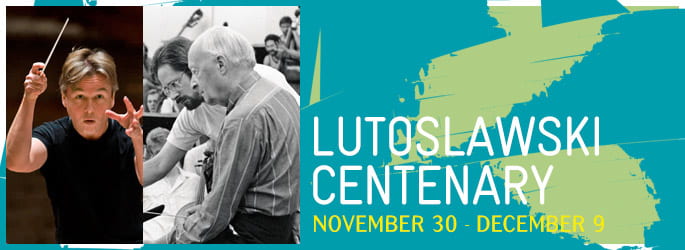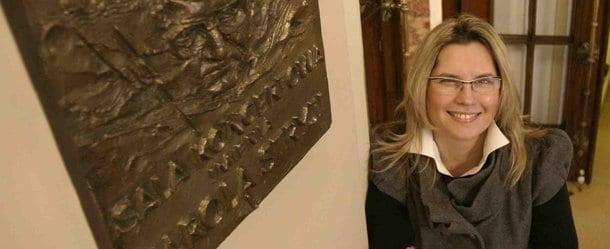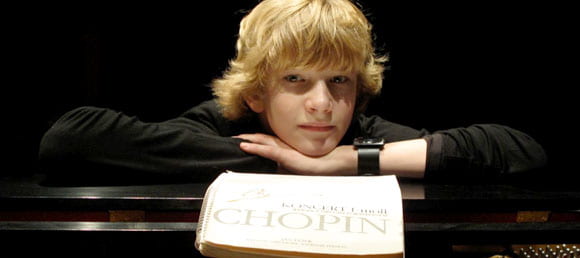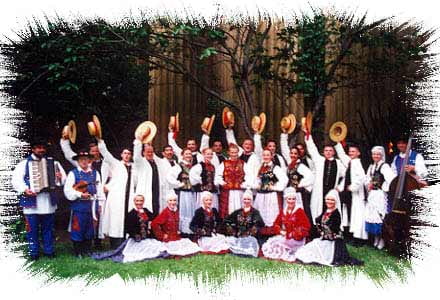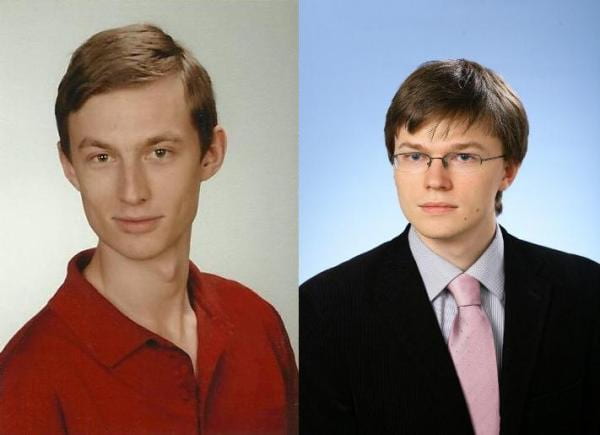Polish Music Newsletter Vol. 18, no. 12
Paderewski Festival Recap
Poland Honors Festival Organizers
On November 10, 2012 in the historic Paso Robles Inn Ballroom, the government of the Republic of Poland honored six women integrally involved in the current and past operations of the Paderewski Festival in Paso Robles with the Medal of Merit to Polish Culture. By decree of the Minister of Culture and National Heritage, Bogdan Zdrojewski, the Medals were presented by the Consul General of Poland in Los Angeles, Joanna Kozińska-Frybes, to the following recipients:
ALICE CASS: Festival guest coordinator and host since 2006
KRYSTA CLOSE: Festival Board of Directors member since 2006 – Artist liaison and exhibit coordinator
MARJORIE HAMON: Festival Board of Directors member since 2007 – Treasurer and Youth Exchange Program coordinator
NORMA MOYE: Member of current Festival Advisory Board and organizer of the original Paderewski Festival in 1991
BARBARA PARTRIDGE: Co-founder of the original Paderewski Festival in 1991
CRI CRI SOLAK-EASTIN: Festival Board of Directors member since 2007 – Public Relations officer and website coordinator
Also honored posthumously during the ceremony was VIRGINIA PETERSON, founder of the original Paderewski Festival. The honor was accepted by her grandson and Festival Board member, Joel Peterson.
Pursuant to article 6A of Poland’s cultural law as adopted on October 25, 1991, the Medal for Merit to Polish Culture [Odznaka Honorowa “Zasłużony dla Kultury Polskiej”] is bestowed upon Polish and foreign nationals—both as individuals and organizations—who serve the culture of Poland with distinction. With this honor, the Ministry of Culture and National Heritage recognizes those who support Polish culture and art abroad, and work to strengthen cultural relations between Poland and foreign countries.
During the same ceremony, which opened the Saturday evening gala concert of the 2012 Paderewski Festival, members of the delegation representing the Province of Tarnów also recognized several other Festival organizers with a Paderewski statuette. Crafted in honor of the 70th anniversary of Paderewski’s death, this same statuette was first bestowed upon Festival Board President Steve Cass and Paso Robles Mayor Pro-tem John Hamon during a ceremony in 2011 in Tarnów, Poland. Continuing their recognition of the partnership between Paso and Tarnów, District Supervisor Mieczysław Kras and Director of Cultural Promotion Ryszard Ządło presented the honorary statuettes to the following Paderewski Festival organizers:
HON. JOANNA KOZIŃSKA-FRYBES: Consul General of the Republic of Poland in Los Angeles and annual organizational partner of the Festival
FRANK MEECHAM: San Luis Obispo County Supervisor and Festival Advisory Board member since 2006
MAREK ŻEBROWSKI: Festival Board of Directors member since 2006 – Artistic Director
During the same ceremony, former Festival Board President JOEL PETERSON was given a framed set of commemorative Paderewski stamps. The warmth between Festival organizers and our partners from Tarnów was never felt more clearly then at this moment.
Tegnazian Honored With Knight’s Cross
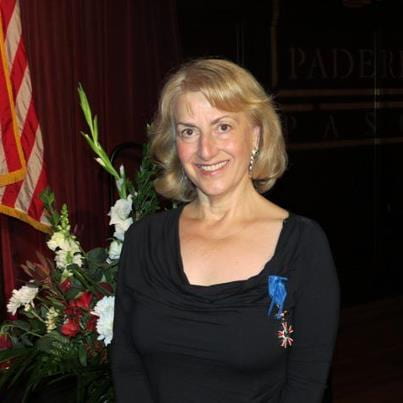 Terry A. Tegnazian, president and co-founder of Aquila Polonica Publishing and long-standing supporter of both the Polish Music Center and the Paderewski Festival, has been awarded the Knight’s Cross of the Order of Merit of the Republic of Poland in recognition of her outstanding services to the Polish community. The prestigious Knight’s Cross of the Order of Merit of the Republic of Poland was given by decision of the President of Poland, Bronislaw Komorowski, in recognition of her outstanding services to the Polish community and promotion of Polish culture abroad.
Terry A. Tegnazian, president and co-founder of Aquila Polonica Publishing and long-standing supporter of both the Polish Music Center and the Paderewski Festival, has been awarded the Knight’s Cross of the Order of Merit of the Republic of Poland in recognition of her outstanding services to the Polish community. The prestigious Knight’s Cross of the Order of Merit of the Republic of Poland was given by decision of the President of Poland, Bronislaw Komorowski, in recognition of her outstanding services to the Polish community and promotion of Polish culture abroad.
Joanna Kozińska-Frybes, Consul General of the Republic of Poland in Los Angeles, presented the medal to Ms. Tegnazian during the Polish Independence Day ceremony on Nov. 10, 2012, hosted by the Consulate as part of the 2012 Paderewski Festival in Paso Robles, Calif.
“To receive this medal is truly an honor. To have my work recognized in this way by the Polish government means a great deal to me,” said Ms. Tegnazian, who is not of Polish heritage. “I look forward to bringing more of the amazing stories of Poland’s heroism and her critical contribution to the Allied victory in World War II to the wider world.”
Aquila Polonica Publishing, founded by Ms. Tegnazian and Stefan Mucha in 2005, is dedicated to publishing, in English, the Polish experience of World War II with first-hand accounts, memoirs, photographs, artwork, poetry, literature and historical studies. Although a relatively young company, each of its titles has won awards, as well as favorable critical reviews.
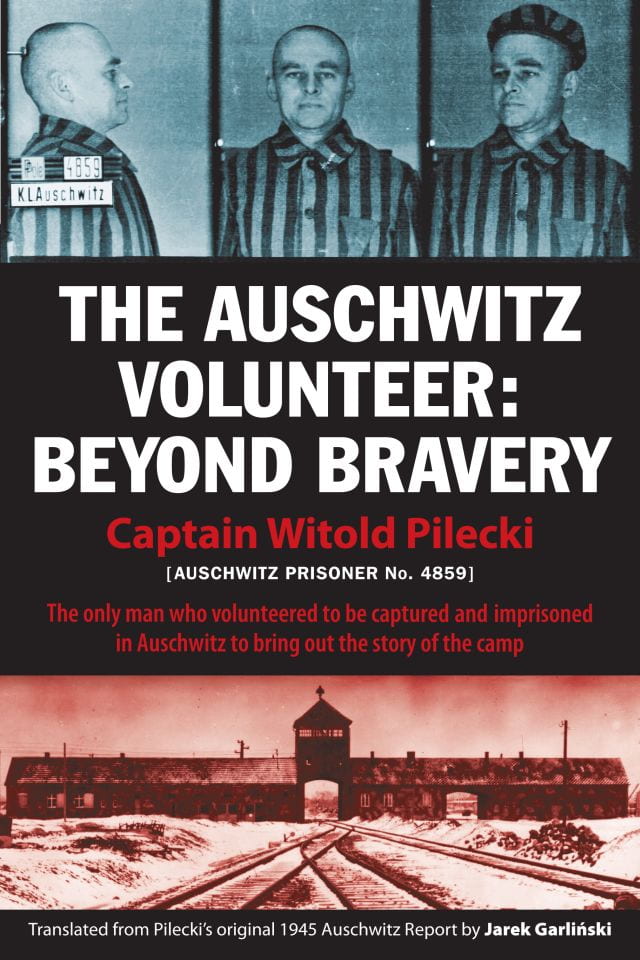 The Los Angeles imprint’s latest title, The Auschwitz Volunteer: Beyond Bravery by Captain Witold Pilecki, is an outstanding example of a WWII story little known outside of Poland. It is Polish Army officer Pilecki’s first-person report of his nearly three-year undercover mission as a prisoner in Auschwitz. Published for the first time in English, this Aquila Polonica title carries an introduction by Professor Norman Davies and a foreword by the Chief Rabbi of Poland. The book has been featured in the New York Times, the Atlantic Monthly and Maclean’s Magazine, among others. Yale Professor Timothy Snyder (Bloodlands) calls The Auschwitz Volunteer “a historical document of the greatest importance” and says Pilecki’s volunteering for Auschwitz was “perhaps one of the most courageous things anyone has ever done.”
The Los Angeles imprint’s latest title, The Auschwitz Volunteer: Beyond Bravery by Captain Witold Pilecki, is an outstanding example of a WWII story little known outside of Poland. It is Polish Army officer Pilecki’s first-person report of his nearly three-year undercover mission as a prisoner in Auschwitz. Published for the first time in English, this Aquila Polonica title carries an introduction by Professor Norman Davies and a foreword by the Chief Rabbi of Poland. The book has been featured in the New York Times, the Atlantic Monthly and Maclean’s Magazine, among others. Yale Professor Timothy Snyder (Bloodlands) calls The Auschwitz Volunteer “a historical document of the greatest importance” and says Pilecki’s volunteering for Auschwitz was “perhaps one of the most courageous things anyone has ever done.”
The Auschwitz Volunteer and Witold Pilecki will be featured at events in January 2013 at the U.S. Holocaust Memorial Museum in Washington D.C. and the Museum of Jewish Heritage in New York City. “It’s important that the world never forget heroes like Witold Pilecki,” said Ms. Tegnazian. “The sacrifice, courage and resilience of the Polish people in the face of tremendous evil stands like a beacon for us today, perhaps now more than ever.”
[Sources: prweb.com]
Paderewski Festival Recap
The 2012 Paderewski Festival celebrated the legacy of Ignacy Jan Paderewski (1860-1941) – world famous pianist, composer, statesman, humanitarian, major California Central Coast land holder, vineyard owner, winemaker and almond grower – with four days of concerts and special events from November 8-11. Featuring internationally renowned performers, young pianists from Poland and the Central Coast region, a monument unveiling and a special lecture, the Festival was held in several venues throughout Paso Robles, California.
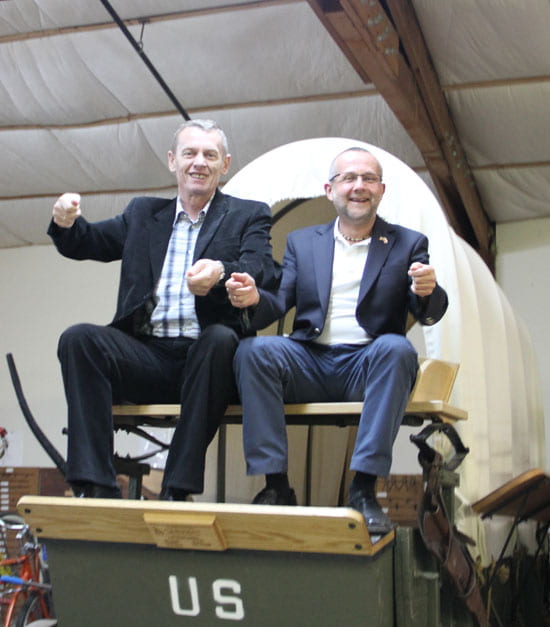 On Thursday, Festival visitors from Tarnów, Poland got their first taste of Paso Robles history, as Tarnów District Supervisor Mieczysław Kras and Director of Cultural Promotion Ryszard Ządło visited the Paso Robles Pioneer Museum and got a personal tour from Museum Board Chairman Chuck Desmond—if only they had already received the cowboy boot they would be gifted later in the weekend, they would have blended right in! In the afternoon, participants in the Paso- Tarnów Youth Exchange Program performed a Festival teaser concert at Cass Winery, which gave the community a taste of excellent music that would fill the weekend.
On Thursday, Festival visitors from Tarnów, Poland got their first taste of Paso Robles history, as Tarnów District Supervisor Mieczysław Kras and Director of Cultural Promotion Ryszard Ządło visited the Paso Robles Pioneer Museum and got a personal tour from Museum Board Chairman Chuck Desmond—if only they had already received the cowboy boot they would be gifted later in the weekend, they would have blended right in! In the afternoon, participants in the Paso- Tarnów Youth Exchange Program performed a Festival teaser concert at Cass Winery, which gave the community a taste of excellent music that would fill the weekend.
On Thursday evening, the Opening Concert of the Festival was held at Vina Robles Winery featuring Café Musique, a local group known for their unique musical kaleidoscope of classical, swing, gypsy, folk and tango music. Hailing from the Central Coast of California, Café Musique’s members (Brynn Albanese – violin and vocals, Piper Heisig – percussion and vocals, Duane Inglish – accordion, Fred Murray – bass, and Craig Nuttycombe – guitar and vocals) gave a rousing performance that had members of the audience singing and even dancing along!
On Friday afternoon, Polish-born violinist Kinga Augustyn and Israeli-born pianist Efi Hackmey gave a master class for local pianists and finalists of the Paderewski Youth Piano Competition at California Polytechnic University in San Luis Obispo. Cass Winery in Paso Robles once again hosted the Festival’s Friday evening event, this year featuring Music & Magic with Igor Lipiński, an up-and-coming concert pianist and award-winning magician from Tarnów, Poland. Lipiński proved that excellent pianist skills blend flawlessly with a casual approach to delighting the audience with magic. In addition to classics by Chopin and Bach, Lipiński also treated those present to some of his own compositions.
 As with every year, Saturday was a very busy day, although this year held some particularly exciting surprises. After Park Cinemas hosted a special screening of the romantic tale Moonlight Sonata, a 1937 film featuring exquisite piano solos performed by Paderewski, at 1:00 p.m. a new bronze monument of Ignacy Jan Paderewski was unveiled in the Paso Robles City Park. Although placing this monument in the Park has been a long held dream of the local collector and Festival supporter who origanally commissioned the statue, Hy Blythe, City officials were not moved by the project until the Festival Board took up the cause this past year. Upon seeing Paderewski’s image shining in the autumn sun—and lauded by such dignitaries as Consul General Joanna Kozińska-Frybes, California Assemblyman Katcho Achadjian, District Supervisor Frank Mecham, Paso Robles Mayor pro tem John Hamon and Board President Steve Cass—all those gathered knew that Paderewski was right where he belonged.
As with every year, Saturday was a very busy day, although this year held some particularly exciting surprises. After Park Cinemas hosted a special screening of the romantic tale Moonlight Sonata, a 1937 film featuring exquisite piano solos performed by Paderewski, at 1:00 p.m. a new bronze monument of Ignacy Jan Paderewski was unveiled in the Paso Robles City Park. Although placing this monument in the Park has been a long held dream of the local collector and Festival supporter who origanally commissioned the statue, Hy Blythe, City officials were not moved by the project until the Festival Board took up the cause this past year. Upon seeing Paderewski’s image shining in the autumn sun—and lauded by such dignitaries as Consul General Joanna Kozińska-Frybes, California Assemblyman Katcho Achadjian, District Supervisor Frank Mecham, Paso Robles Mayor pro tem John Hamon and Board President Steve Cass—all those gathered knew that Paderewski was right where he belonged.
The monument’s sculptor Jesse Corsaut was also present for the unveiling. Amazed at the huge crowd of local and international guests in attendance, he especially enjoyed the Paso Robles High School Band, which gave rousing renditions of the Polish and American national anthems as well as several favorites from their marching band repertoire. Corsaut was also pleased to see a flower in the hand of Paderewski. This is the 5th Paderewski statue from this mold, and will be the last. The other four are at the Blythe Ranch in Paso Robles, the Polish Embassy in Washington, USC’s Thornton School of Music in Los Angeles, and Jagellonian University in Krakow.
At 4:00 p.m., winners of the 2012 Paderewski Youth Piano Competition were featured in a recital at the historic Paso Robles Inn Ballroom. Emerging talents from San Luis Obispo County competed with young entrants from Monterey and Santa Barbara Counties for the privilege of appearing at this year’s Festival and participating in the Youth Exchange in Poland. The performers, who are pictured left to right, were Sydney Haughian (12) – Honorable Mention, Junior Division; Kevin Park (11) – Honorable Mention, Junior Division; Cian Amor (11) – Third Place, Junior Division; Daniel Ha (12) – Second Place, Junior Division; Jack Raventos (12) – First Place, Junior Division; Evan Lin (15) – Paderewski Legacy Award, Senior Division; and Gianna Zufall (15) – First Place, Senior Division. Besides works by Bach, Beethoven, Mozart, Debussy, and Khachaturian, these young talents performed solo piano compositions by Chopin and Paderewski.
Following a reception hosted by the Polish Consulate General in Los Angeles and featuring wines from Epoch Estate Wines and Cass Winery at which many Festival organizers were honored (see article above), Saturday evening was capped off by the much-anticipated 2012 Paderewski Festival Gala Concert at the Paso Robles Inn Ballroom. The Gala artists were highly-acclaimed violinist Kinga Augustyn and her recital partner, pianist Efi Hackmey, who displayed astounding musicianship that moved between laser-like focus and floating beauty. Their all-Polish program—including music by Paderewski, Karol Szymanowski and Henryk Wieniawski—left the audience in silent rapture. As in the past few years, the Festival Gala Concert capped the annual Paso Robles Elegant Evening, a popular event among residents and merchants in the city’s Downtown.
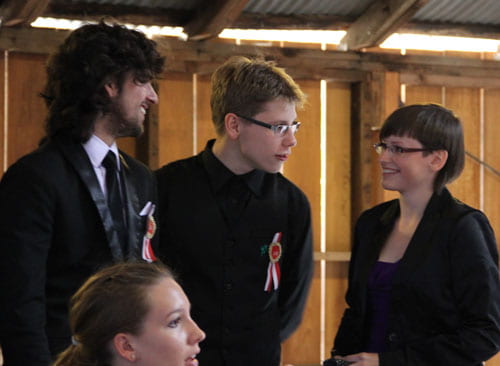 The 2012 Paderewski Festival closed on Sunday with a celebration of Poland’s November 11 Independence Day. Held at the rolling hills of Halter Ranch Winery, the afternoon featured a lecture about Paderewski’s childhood by Marek Żebrowski, Director of the Polish Music Center at USC and scrumptious meal served by Cass Catering. After lunch there was a recital by the Exchange Program Students from Poland, who are picutured from left to right: Marcin Krysa (20), Ula Barnaś (17) and Robert Maciejowski (14), as well as an encore duet featuring former Exchange participant and Monterrey native, Madeline Anderson (below). To read more about the final event at Halter Ranch, vist halterranch.com.
The 2012 Paderewski Festival closed on Sunday with a celebration of Poland’s November 11 Independence Day. Held at the rolling hills of Halter Ranch Winery, the afternoon featured a lecture about Paderewski’s childhood by Marek Żebrowski, Director of the Polish Music Center at USC and scrumptious meal served by Cass Catering. After lunch there was a recital by the Exchange Program Students from Poland, who are picutured from left to right: Marcin Krysa (20), Ula Barnaś (17) and Robert Maciejowski (14), as well as an encore duet featuring former Exchange participant and Monterrey native, Madeline Anderson (below). To read more about the final event at Halter Ranch, vist halterranch.com.
For more information on the Paderewski Festival in Paso Robles, please visit the Festival’s website: www.paderewskifest.com.
PMC News
How You Can Support The PMC
Dear Friend of Polish Music,
First of all, we would like to thank you for your past support—be it attending our concerts, contributing financially, volunteering at our events, assisting in our library, or spreading a good word about who we are and what we are trying to accomplish. As 2012 draws to a close, once again we are contacting you with the annual appeal in support of the Polish Music Center at USC, the only institution of its kind outside of Poland that preserves and promotes Polish music locally and provides research assistance to scholars and performers worldwide.
The highlights of the year included a two-day Festival of Premieres in March and the October’s Paderewski Lecture-Recital, devoted to Karol Szymanowski on the occasion of the 75th anniversary of his death. This year—just like every year since 2006—we have also organized the Paderewski Festival in Paso Robles and corresponding Paderewski Youth Piano Competition, and hosted three young pianists from Tarnów, who come to the U.S. to perform at the Festival in Paso and participate in educational opportunities we create for them at USC.
We are sure that more than a handful of Polish-Americans can be proud of supporting the Polish Music Center, an institution that has served Polish musical culture since 1985. Although we cast our appeal far and wide, the response to our fundraising is still inadequate and the list of our sponsors—which appears in all of our program booklets—remains embarrassingly short. Please keep in mind that the amount contributed by each individual is as important as the overall number of supporters, because we would like to know that what we do on an everyday basis meets with your approval and merits your sponsorship.
Since individual donations sustain everything we do, if you have not contributed to us yet, please consider making a donation this year. If you are a previous donor, please accept our heartfelt thanks for your generosity and goodwill. Checks can be mailed to:
USC Polish Music Center
840 West 34th St.
Los Angeles, CA 90089-0851
To donate by credit card, contact the PMC directly or visit giveto.usc.edu—you will find a checkbox for the PMC under University-wide Giving Opportunities > Centers and Institutes > Music. Please be sure all donations indicate “USC Polish Music Center,” either in the remittance line of your check or online, to ensure that your contribution is routed directly to our department.
If you would like to include the Polish Music Center in your estate planning, please let us know. The University administers annuity programs that are very attractive to both donor and recipient alike.
As always, we invite you to stop by our library on the USC campus, to see first-hand what we are trying to accomplish. Please call us at (213) 821-1356 or email polmusic@thornton.usc.edu if you have any questions or would like to schedule a visit to the Center.
Thank you for your consideration. With our best wishes for the Holiday Season, we remain sincerely and gratefully yours,
Marek Zebrowski, Director
Krysta Close, Assistant Director
News
Composition Competition For Lutosławski’s 100th Birthday
In order to celebrate and popularize the 100th birthday of Witold Lutosławski, the Witold Lutosławski Society and the Polish Composers’ Union (ZKP) announce a composition competition. The competition is international in character and has no territorial restrictions or age limit for competitors.
The task of the competition is the competition of a piece for a symphonic orchestra similar to those employed by Lutosławski in his last symphonies (for example: 3(2picc)3(1ci)3(2picc, 1clb)3(1 cfg), 4441, timp, batt, cel, 2 ar, 2 pf, archi). It must be original, and may not have been awarded prizes in other competitions nor performed publicly. Submissions must be at least 10 minutes and may not exceed 25 minutes.
Only compositions sent to the Society before or on January 25, 2013 (the 100th birthday of the competition’s patron of the competition) will be eligible for the competition. The date of submission is based on the post stamp. In order to participate in the competition individuals must pay a participation fee of 50 Euro into the Society’s bank account (bank account number: 11 1240 1037 1978 0010 0182 9201. IBAN: PL; BIC/SWIFT: PKOPPLPW) and send the composition in: electronic form saved on CD, DVD or USB stick and a hard copy.
As nominated by the Witold Lutosławski Society and the Polish Composers’ Union, the members of the jury are: Luca Francesconi, Kazimierz Kord, Magnus Lindberg, Steven Stucky, Paweł Szymański and Tadeusz Wielecki.
The competition will conclude in March when its results will be made public. Three prizes will be awarded, including a first prize of 10,000 Euro. Upon the jury’s prerogative specific amounts shall be awarded, and the jury’s decisions are final. The winning composition will be performed during the International Warsaw Autumn Festival of Contemporary Music, at which time the composers will also be awarded. Competition organizers will be responsible for promoting the winning compositions and will attempt to arrange further performances.
In order to participate, composers must submit: their work under a pseudonym in both electronic form (CD, DVD or USB stick) and hard copy); proof of the participation fee payment; an envelope with the same pseudonym containing the author’s name, street and email addresses and telephone number. Submissions should be sent to:
Witold Lutosławski Society
ul. Bracka 23
00-028 Warsaw, Poland
Further questions should be addressed to Society’s office by telephone/fax (+48 22 826 90 25) or email (society@lutoslawski.org.pl). Each parcel must contain the return address.
Application deadline: 25th January 2013
[Source: press release]
Lutosławski Centenary at L.A. Phil
In November and December, the Los Angeles Philharmonic will be celebrating the Lutosławski Centenary at Walt Disney Concert Hall in downtown Los Angeles. The Phil’s Conductor Laureate, Esa-Pekka Salonen, celebrates the great Polish musician with performances of Lutosławski’s Symphony No. 4 (originally commissioned by the LA Phil) and Les espaces du sommeil. Also, a concert featuring works by Lutosławski, plus Salonen and Steven Stucky, two of Lutosławski’s most important advocates, will be performed as a part of the Phil’s Green Umbrella series. Concert details are below:
Saturday, December 1 at 8 PM
Sunday, December 2 at 2:00 PM
LUDWIG VAN BEETHOVEN King Stephen Overture
WITOLD LUTOSŁAWSKI Symphony No. 1
WITOLD LUTOSŁAWSKI Fanfare for the Los Angeles Philharmonic
LUDWIG VAN BEETHOVEN Symphony No. 2
As a cabaret pianist on the run from the Nazis in occupied Warsaw and then a staunchly independent composer denounced by Communist party apparatchiks, Witold Lutosławski survived some of the 20th-century’s grimmest years, and his cultural importance seems only to have grown since his death. Lutosławski became a close artistic associate of the LA Phil and Esa-Pekka Salonen in the last decade of his life, and his First Symphony will be recorded at these concerts to complete a Salonen/LA Phil cycle of the composer’s four symphonies for Sony Classical.
Tuesday, December 4 at 8:00 PM
 Lionel Bringuier, conductor
Lionel Bringuier, conductor
Laura Claycomb, soprano
WITOLD LUTOSŁAWSKI Partita
STEVEN STUCKY Ad Parnassum
ESA-PEKKA SALONEN Homunculus
WITOLD LUTOSŁAWSKI Chantefleurs et Chantefables
The Green Umbrella series celebrates Lutosławski with his Partita and his magical song-cycle Chantefleurs et Chantefables on Robert Desnos’ enchanting poems for children, as well as with works by two of Lutosławski’s most important advocates, Esa-Pekka Salonen and Steven Stucky.
Saturday, December 8 at 8:00 PM
Sunday, December 9 at 2:00 PM

Esa-Pekka Salonen, conductor
David Fray, piano
Gerald Finley, baritone
ESA-PEKKA SALONEN Nyx (West Coast premiere)
ROBERT SCHUMANN Piano Concerto
WITOLD LUTOSŁAWSKI Les espaces du sommeil
PETER ILYICH TCHAIKOVSKY Francesca da Rimini
Salonen is joined by acclaimed Canadian singer Gerald Finley for Lutosławski’s setting of another Robert Desnos poem, “The Spaces of Sleep.” Young French pianist David Fray plays Schumann’s magnificently Romantic concerto. The program opens with Salonen’s newest orchestral creation.
[Source: laphil.com]
New Górecki Documentary
A documentary on the subject of Henryk Mikołaj Górecki, one of the most eminent contemporary Polish composers, was premiered at the Kosmos Cinema in Katowice on the second anniversary of the composer’s death. Directed by Violetta Rotter-Kozera (pictured above) from TVP Katowice, the title of the film—Please find – Henryk Mikołaj Górecki—refers to the wave of extraordinary popularity of Górecki in the early 1990s, when the recording of his Symphony of Sorrowful Songs, made by London Sinfonietta under David Zinman with well-known American soprano Dawn Upshaw, became a hit in the British and American music charts.
“This music has moved many people all over the world who began to write to Henryk Mikołaj Górecki. They did not know the address and only wrote his name correctly, adding Poland, or Katowice, Poland, and making a note for the post office: Please find” explained Rotter-Kozera to Gazeta Wyborcza (November 9, 2012).
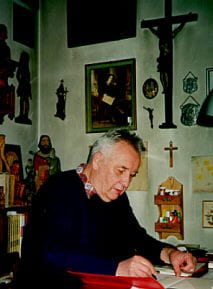
April 1998. Photo by Maja Trochimczyk.
In the film she tells the story of one of the senders, a teenage girl, burned in a fire, in which her mother and sister died. She was saved by her father, who jumped out with her from the third floor. She was in such a serious condition that it took her a whole day to write the letter. She wrote the composer that his music is the only reason for her to live.
Footage for the film was shot at the University of Southern California where, on the invitation of the Polish Music Center, Górecki conducted the famous work for one of the few times in his life during the Górecki Autumn celebration of October 1997. The director was also given access to the composer’s letter archives, carefully arranged by the maestro’s wife. She herself speaks in the film, as did their children, who also followed a musical path – daughter Anna is a pianist, and son Mikołaj a composer.
The documentary was shot in Poland, the United States, Switzerland, Holland, France and Denmark. Górecki is remembered by Peter Weir, Krzysztof Penderecki, Jan A.P. Kaczmarek, Wojciech Waglewski, David Zinman, Antoni Wit, and musicians of the Lamb and Kronos Quartets.
“In the film I am trying to touch on the phenomenon of Henryk Mikołaj Górecki’s universal music, not explain it, because it is a mystery,” stressed the director.
[Source: beethoven.org.pl]
Możdżer At Białystok Phil
 On December 1 at 7:00 pm on the Main Stage of the Podlasie Opera and Philharmonic in Białystok, pianist Leszek Możdżer presented his concert entitled “From Chopin to Komeda.” The work of these eminent composers is particularly dear to the pianist, who has recorded excellent albums “Chopin – Impressions” and “Komeda.” Możdżer performed some of these same works during his intimate performance at Cass Winery during the 2011 Paderewski Festival in Paso Robles.
On December 1 at 7:00 pm on the Main Stage of the Podlasie Opera and Philharmonic in Białystok, pianist Leszek Możdżer presented his concert entitled “From Chopin to Komeda.” The work of these eminent composers is particularly dear to the pianist, who has recorded excellent albums “Chopin – Impressions” and “Komeda.” Możdżer performed some of these same works during his intimate performance at Cass Winery during the 2011 Paderewski Festival in Paso Robles.
This incredible artist feels equally at home with classical and jazz music. For years, he has consistently followed his own path at all costs without trying to please the audience, yet the concert halls are always filled to capacity during his performances. He once confessed: “I hatched a plan to be a total musician and develop in all directions,” a plan which he consistently follows.
For more information on the concert, see: www.oifp.eu
[Source: beethoven.org.pl]
Lisiecki at the NY Phil
The Kosciuszko Foundation recommends Daniel Harding Conducts Schumann and Sibelius at the New York Philharmonic featuring Jan Lisiecki, piano. The concert will take place on December 13-15, 2012. Pianist Jan Lisiecki, age 17, was born in Calgary to Polish parents. He has performed at Carnegie Hall, the Philharmonic Concert Hall, Seoul Arts Centre, and Paris’s Salle Cortot, and has shared the stage with Emanuel Ax, Yo-Yo Ma, and Pinchas Zukerman. He received the 2010 Révélations Radio-Canada Musique and Jeune Soliste des Radios Francophones awards, and he records exclusively for Deutsche Grammophon, who signed him when he was 15.
There is a group discount for KF Members who wish to attend the concert. You will get approximately 25% off the ticket’s price by calling Peter Meyer, Group Service Coordinator at the New York Philharmonic and using our code. To get the code, you need to call our Membership Department at 212-734-2130 ext. 216 or email Sandra Wyszomirska at swyszomirska@thekf.org.
December 13-15, 2012 | various times
Jan Lisiecki at the New York Philharmonic
Avery Fisher Hall
10 Lincoln Center Plaza, NY NY 10023
Tickets must be purchased no later than December 10th
[Source: thekf.org]
Two Warszyńskis At The ESO
 A performance featuring Tatiana and Mikołaj Warszyński with the Edmonton Symphony Orchestra under the direction of conductor Lucas Waldin was held on December 2, 2012 at the Winspear Centre for Music in Edmonton. The two Warszyńskis—mother and son—took center stage as featured soloists on violin and piano. Tatiana (a violinist with the ESO) was very excited to be playing “with her own orchestra” in one of the best music halls in Northern America alongside her pianist son, Mikolaj.
A performance featuring Tatiana and Mikołaj Warszyński with the Edmonton Symphony Orchestra under the direction of conductor Lucas Waldin was held on December 2, 2012 at the Winspear Centre for Music in Edmonton. The two Warszyńskis—mother and son—took center stage as featured soloists on violin and piano. Tatiana (a violinist with the ESO) was very excited to be playing “with her own orchestra” in one of the best music halls in Northern America alongside her pianist son, Mikolaj.
The concert program included music from the opera Ariodante by Handel, followed by the beautiful movements from Wieniawski’s 2nd Violin Concerto, Mendelssohn’s Concerto for Violin and Piano, and Mozart’s Piano Concerto No. 27. The ESO finished the program with the fabulous Symphony No. 2 of Schubert.
[Source: press release from Polish Culture Society of Edmonton]
Glinka Recital – An Evening Of Romantic Music
 The Polish Culture Society of Edmonton, AB is pleased announce its annual Holiday Season performance on Friday, December 14. This year, the Society welcomes one of Poland’s most exceptional artists, flautist Iwona Glinka, who will perform accompanied by Edmonton’s own Joachim Segger. Under the self-explanatory title “Polish Romantic Masterworks,” the evening will feature many true gems of Polish music from the period.
The Polish Culture Society of Edmonton, AB is pleased announce its annual Holiday Season performance on Friday, December 14. This year, the Society welcomes one of Poland’s most exceptional artists, flautist Iwona Glinka, who will perform accompanied by Edmonton’s own Joachim Segger. Under the self-explanatory title “Polish Romantic Masterworks,” the evening will feature many true gems of Polish music from the period.
Iwona Glinka, very justly considered one of Poland’s most unique soloists, is endowed with an incredible interpretative imagination and a powerful stage presence. Her vast repertoire includes works from Baroque to contemporary, many of the latter written especially for her. Glinka will appear alongside one of the most distinguished North American pianists, Edmonton-based Joachim Segger. Together, they will present exciting music imbued with the Romantic spirit and penned by some of Poland’s greatest composers: Chopin, Moniuszko, Oginski, Tansman, Dobrzyński, and others. Two very lovely and virtually unknown miniatures by Polish contemporary masters, Krzysztof Penderecki and Witold Lutosławski, are also on the program, receiving their Canadian premières.
December 14, 2012 | 8:00 P.M.
Polish Romantic Masterworks – Iwona Glinka, flute & Joachim Segger, piano
Muttart Hall – Alberta College
10050 Macdonald Dr., Edmonton, AB
Tickets: $25 (adults), $20 (students and seniors) and $15 (Polish Culture Society members), available from Tix on the Square and at the door
For further information please call 780-732-3599 or visit polishculturesociety.com
[Source: press release via polishculturesociety.com]
Korzistka At PMAL Benefit Concert
 The Polish Museum of America (PMA) and its Library (PMAL) cordially invites you to the Michał Korzistka’s piano recital on December 16, 2012 at 3:00 pm in the Sabina P. Logisz Great Hall. The concert program will include the works of F. Chopin, K. Szymanowski and W. Kilar. The suggested donation is $10.00 and at the request of the artist, all proceeds will benefit the Rare Book Restoration Project of the PMA Library.
The Polish Museum of America (PMA) and its Library (PMAL) cordially invites you to the Michał Korzistka’s piano recital on December 16, 2012 at 3:00 pm in the Sabina P. Logisz Great Hall. The concert program will include the works of F. Chopin, K. Szymanowski and W. Kilar. The suggested donation is $10.00 and at the request of the artist, all proceeds will benefit the Rare Book Restoration Project of the PMA Library.
The library holdings include 300 rare books as part of the “Rare Book Restoration Project” which was initiated in 2012. Due to the generosity of Friends of the PMAL, we have been able to conserve and restore six books published between 1508-1604. The average conservation cost per book is $689. Currently, we are in the process of cataloging all books published before 1945. It is our hope to conserve as many rare books as possible by 2015, during which time we will celebrate the PMA Library centennial.
For event details, visit www.facebook.com.
Michał Korzistka was born in Bielsko-Biala, Poland, and began playing the piano at the age of five, under the tutelage of Helena Korzistka, his grandmother, an experienced piano teacher. He was admitted to the Music Grammar and High School in Bielsko-Biala, where he studied with Professor Tanewski, then attended the Academy of Music in Katowice, where he studied with Professor Zmudzinski and received an M.A. in Classical Music. He continued his study of classical piano with Professor Sulikowski at the Postgraduate Piano Department of the Academy of Music in Warsaw and with Professor Buchbinder in Zurich, graduating with two D.M.A. degrees—one in instrument mastery and the other in piano performance.
During his early years, Michał performed many concerts, both solo and with the accompaniment of the orchestra. He has a special place in his heart for classical and romantic composers: Beethoven, Mozart, Liszt, Szymanowski, and Chopin. He has performed in Poland and abroad; among others, at the Chopin Mansion in Zelazowa Wola, Poland; at the famous concert series at the Chopin Monument in Lazienki Park in Warsaw; at “Atma” in Zakopane; at the Pszczyna Castle; in Great Britain; Germany; the Czech Republic; and in the U.S. Currently he works with the National Concert Bureau in Warsaw and the Silesia Art Agency in Katowice. Over the years, Michał has also made a number of recordings, including a live recording of his concert with an orchestra in Weston, Great Britain; a “Music in Bielsko-Biala” CD; recordings for the Second Channel of the Polish Radio; and archival recordings for his alma mater, the Academy of Music in Katowice.
Michał qualified for many international and national piano competitions. He played at the International Music Competition in Gallo-Monza in Italy; the 2nd International Music Competition in Japan; the 1st Szymanowski National Piano Competition; and the 42nd Chopin Festival in Duszniki Zdroj. He is a recipient of the F. Chopin Society grant; he took the second and the special prize in the 1st Szymanowski Piano Competition for his performance of the Szymanowski Concerto Symphony; and he also received a prize at the Polish Pianist Competition in Slupsk.
Presently, Michał is a full professor at the Cieszyn Branch of the University of Silesia, where he teaches piano and other music courses. In addition, he teaches at the Music School in Zywiec and is the Vice President of the Bielsko Music Society. He also organizes international master classes for young pianists, under the auspices of the University, and continues to perform in Poland and abroad. His dual career – as a performing artist and a classical piano professor – leaves him limited time which he devotes mostly to his family.
December 16, 2012 | 3:00 pm
Piano Recital by Michał Korzistka
Polish Museum of America
984 N. Milwaukee Ave.
Chicago, IL 60642
For more info, contact: malgorzata-kot@polishmuseumofamerica.org
[Source: press release from PMA]
Lira Ensemble Holiday Concerts In MI & IL
 The Lira Ensemble, known for its excellent performances of Polish music, song and dance, offers two concerts this Christmas season entitled “Polish Carols, Song & Dance.” Featuring the Lira Singers, Lira Dancers and Lira Symphony, one of the concerts happened on Sunday, November 25 at the Macomb Center for the Performing Arts in suburban Detroit and the next performance will take place on Sunday, December 9 in the North Shore Center for the Performing Arts in suburban Chicago.
The Lira Ensemble, known for its excellent performances of Polish music, song and dance, offers two concerts this Christmas season entitled “Polish Carols, Song & Dance.” Featuring the Lira Singers, Lira Dancers and Lira Symphony, one of the concerts happened on Sunday, November 25 at the Macomb Center for the Performing Arts in suburban Detroit and the next performance will take place on Sunday, December 9 in the North Shore Center for the Performing Arts in suburban Chicago.
This Christmas concert is also a celebration of Polish and Polish-American culture. The Lira Singers, Dancers, and Symphony will perform some of the most beloved and most popular Polish holiday music. This concert offers the rare opportunity to hear Polish carols in arrangement for symphony orchestra. The Lira Ensemble will also perform works by Polish master composers such as Frederic Chopin, Stanisław Moniuszko and Witold Lutosławski, one of the most respected Polish composers of the 20th century. The concert includes folk song and dance from various regions of Poland in colorful, authentic folk costumes. Some American carols and folk songs will complete the program.
The Chicago Tribune is among the many metropolitan newspapers that have given high praise to the Lira company. The Tribune wrote: “Chicago’s Lira Ensemble…gorgeous music and sharply choreographed folk dance.”
 The concerts feature 13-year-old Daniel Szefer—a piano prodigy who will perform music of Frederic Chopin including the Andante Spianato and Grand Polonaise Brillante. Earlier this year, this young Polish-American was the youngest finalist in one of the most challenging youth piano competitions in the United States – the Chicago Symphony Orchestra Youth Auditions. Daniel played Beethoven’s Concerto Nr. 5 and placed second (1st Alternate). Despite his young age, he has already performed throughout the US.
The concerts feature 13-year-old Daniel Szefer—a piano prodigy who will perform music of Frederic Chopin including the Andante Spianato and Grand Polonaise Brillante. Earlier this year, this young Polish-American was the youngest finalist in one of the most challenging youth piano competitions in the United States – the Chicago Symphony Orchestra Youth Auditions. Daniel played Beethoven’s Concerto Nr. 5 and placed second (1st Alternate). Despite his young age, he has already performed throughout the US.
Both concerts will be conducted by Lira resident conductor Mina Zikri who was born in Cairo, Egypt and came to the United States in 1999. In addition to his duties with Lira, he is a guest conductor for the Cairo Symphony Orchestra in Egypt and is founder and music director of the Oistrach Symphony Orchestra of Chicago. Mr. Zikri, who is also a violinist, has performed with the Lira Symphony for the past 5 years and has been a member of Daniel Barenboim’s West Eastern Divan orchestra since 1999.
As with all Lira performances, the concerts will be narrated in English by Lucyna Migala of WCEV/1450am, who is artistic director and general manager of the Lira Ensemble. Ms. Migala will share some Polish holiday traditions and will offer a bit of the history and tradition behind the music and dance performed.
The Lira company is artist-in-residence at Loyola University Chicago and is the nation’s only professional performing arts company specializing in Polish music, song and dance. The mission of the company is to bring the best of Polish culture into American life.
Both concerts are co-sponsored by the Consulate of the Republic of Poland in Chicago and by the Lira Society-Group 816 of the Polish Women’s Alliance of America. The Skokie concert is funded in part by the Illinois Arts Council – a state agency. The work of the Lira Ensemble also supported by grants from the Alphawood Foundation, the Gaylord & Dorothy Donnelley Foundation, the Richard H. Dreihaus Foundation and the MAcArthur Foundation.
Both theaters open at 2:30pm for the concerts. Lira recordings will be available for purchase in the two lobbies.Tickets for “Polish Carols, Song & Dance” are very reasonably priced so that families can attend – from $35 to $55, with discounts for groups of 20 or more and half price tickets for children under age 16 in all price ranges.
Sunday, December 9, 2012 at 3pm
“Polish Carols, Song & Dance” with Lira Singers, Lira Dancers and Lira Symphony
North Shore Center for the Performing Arts
9501 Skokie Boulevard, Skokie, Illinois
All seats are reserved
Tickets: available at venue or by calling Lira at 773-508-7040 or 1-800-547-5472
More info: www.liraensemble.org
[Source: press release]
Slavic Choral Christmas Concert
On December 14, Łowiczanie Polish Folk Ensemble presents their annual Slavic Choral Christmas Concert. This rich and varied repertoire of vocal and instrumental music from throughout Eastern and Central Europe and the Balkans will be presented one night only in the atmosphere of a traditional East-European Christmas and wintertime magic. Costumed ethnic community choirs will be singing seasonal, time-honored carols and songs from Bulgaria, Czech Republic, Lemkolands, Poland, Serbia, Ukraine and more.
Professional musicians evoke a sense of timelessness with a wealth of traditions and instruments. Your ticket includes a complimentary glass of mulled cider or wine, heightening the flavor of a European Christmas Fair. Concert concludes with the popular audience sing-along. Purchase some unique gifts at the holiday fair table.
The Artists: Łowiczanie Polish Choir & Folk Band, Ukrainian Folk Group “Koliada;” Bulgarian Group “Koledari;” Hungarian Folk Singing Circle; Dalyte Kodzis, classic Polish koledy, Natalia Ukrainska, Trans-Carpathian carols; Ivan Vuksanovic & Predrag Milovac, Serbian carols; and Hungarian Folk Band – medieval Hungarian and Jewish music.
Friday, December 14, 2012 | 7:30 p.m.
Slavic Choral Christmas Concert
Church of the Nativity
240 Fell Street, San Francisco
Tickets: $15/$18 general—$10/$12 students on www.brownpapertickets.com
[Source: press release]
Awards
IX Fitelberg Int’l Competition For Conductors: A Special Report From Poland
By Gary Fitelberg
The 9th Grzegorz Fitelberg International Competition for Conductors took place from November 16 through 25, 2012, in Katowice, Poland, in the heart of Silesian culture. The prize winners were Gold Baton winner Daniel Smith of Australia, Silver Baton winner Marzena Diakun of Poland, and Bronze Baton winner Azis Sadikovic of Austria. Maja Metelska of Poland also received honorable distinction in the Competition. In addition to cash prizes, the winners of this prestigious competition also gain invitations to conduct top orchestras around Poland and throughout the world.
The Jury consisted of prominent conductors from around world. Chairman of the Jury was Antoni Wit, Artistic Director of the Warsaw Philharmonic Orchestra. To read Maestro Antoni Wit’s reflections on judging the Competition, visit www.beethoven.org.pl.
The Jury also included Mirosław Jacek Błaszczyk (Poland) of the Silesian Philharmonic, Juozas Domarkas (Lithuania), Piotr Gajewski (USA) of the National Philharmonic, Martinez Izquierdo (Spain), Eugeniusz Knapik (Poland) of the Karol Szymanowski Academy of Music in Katowice, John Neschling (Brazil), Marek Pijarowski (Poland), 1974 GFICC winner and of the Wroclaw Philharmonic, Maximiano Valdes (Chile), Takuo Yuasa (Japan) and Michael Zilm (Germany). Secretary of the Jury was Katarzyna Pleśniak (Poland) of the Karol Szymanowski Academy of Music in Katowice.
Out of the164 applicants, hailing from 37 countries of all the continents except Africa, 50 candidates were chosen. They came from Australia, Austria, Brazil, China, Columbia, Czech Republic, Finland, France, Germany, Great Britain, Greece, Holland, Ireland, Japan, Lithuania. Mexico, Netherlands, Poland, Russia, South Korea, Taiwan, UK, Ukraine, and the USA. The youngest was only 20 years of age, and the oldest were all born in 1973, competing at thirty-three years old. At least eight were Polish natives, of which four were women and of whom two made it to the second stage of the Competition.
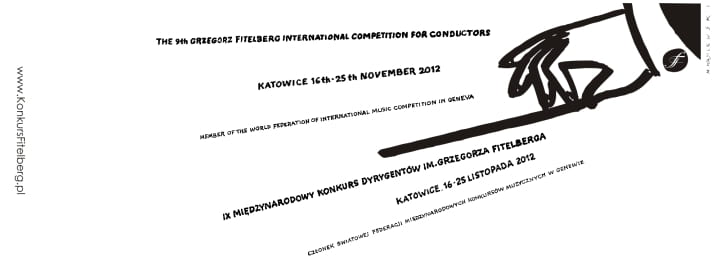 The final 50 contestants and ten alternatives chosen to participate in the Competition included: Acosta Angulo Juan Sebastian (Columbia), Roberto Beltran-Zavala (Mexico) Stijn Berkouwer (Netherlands), Yuan Chang Chih (Taiwan), Marzena Diakun (Poland), Kai-Hsi Fan (Taiwan), Keitaro Harada (Japan), Quentin Hindley (France), Seokwon Hong (South Korea), Sho Itoh (Japan), Rafal Stefan Janiak (Poland), Sylwia Janiak (Poland), Yang Jiao (China), Clemens Jungling (Austria), Stamatia Karampini (Greece), Yoshinao Kihara (Japan), Marta Kluczyńska (Poland), Stansilav Kochanovskij (Russia), Maciej Jakub Koczur (Poland), Andrew Koehler (USA), Markku Laakso (Finlnd), Gyuseong Lee (South Korea),Tae Jung Lee (South Korea), Chin-Chao Lin (Taiwan), Ciaran McAuley (Ireland), Alexander Merzyn (Germany), Maja Metelska (Poland), Alexander Negrin (UK), Przemysław Neumann (Poland), Gemma New (New Zealand), Masane Ota (Japan), Dainius Pavilionis (Lithuania), Fabio Miguel Loutfi-Pereira (Brazil), Olivier Pols (Holland), Nadezda Potemkina (Russia), Jamie Reeves (USA), Andrey Rubtsov (Russia), Azis Sadikovic (Austria), Rustam Samedov (Germany), Shimpei Sasaki (Japan), Daniel Smith (Australia), Daniel Stewart (USA), Eduardo Straussr (Brazil), Maciej Sztor (Poland), Ondrej Tajovsky (Czech Republic), Justus Thorau (Germany), Zoi Tsokanou (Greece) Jiang Xie (China), Hyun Jin Yun (South Korea), and Joannes Zur (Germany).
The final 50 contestants and ten alternatives chosen to participate in the Competition included: Acosta Angulo Juan Sebastian (Columbia), Roberto Beltran-Zavala (Mexico) Stijn Berkouwer (Netherlands), Yuan Chang Chih (Taiwan), Marzena Diakun (Poland), Kai-Hsi Fan (Taiwan), Keitaro Harada (Japan), Quentin Hindley (France), Seokwon Hong (South Korea), Sho Itoh (Japan), Rafal Stefan Janiak (Poland), Sylwia Janiak (Poland), Yang Jiao (China), Clemens Jungling (Austria), Stamatia Karampini (Greece), Yoshinao Kihara (Japan), Marta Kluczyńska (Poland), Stansilav Kochanovskij (Russia), Maciej Jakub Koczur (Poland), Andrew Koehler (USA), Markku Laakso (Finlnd), Gyuseong Lee (South Korea),Tae Jung Lee (South Korea), Chin-Chao Lin (Taiwan), Ciaran McAuley (Ireland), Alexander Merzyn (Germany), Maja Metelska (Poland), Alexander Negrin (UK), Przemysław Neumann (Poland), Gemma New (New Zealand), Masane Ota (Japan), Dainius Pavilionis (Lithuania), Fabio Miguel Loutfi-Pereira (Brazil), Olivier Pols (Holland), Nadezda Potemkina (Russia), Jamie Reeves (USA), Andrey Rubtsov (Russia), Azis Sadikovic (Austria), Rustam Samedov (Germany), Shimpei Sasaki (Japan), Daniel Smith (Australia), Daniel Stewart (USA), Eduardo Straussr (Brazil), Maciej Sztor (Poland), Ondrej Tajovsky (Czech Republic), Justus Thorau (Germany), Zoi Tsokanou (Greece) Jiang Xie (China), Hyun Jin Yun (South Korea), and Joannes Zur (Germany).
Grzegorz Fitelberg (1879-1953) was among the most distinguished Polish conductors in history, having conducted and/or founded several of Poland’s leading orchestras, including the Warsaw Philharmonic Orchestra, Polish National Radio Symphony Orchestra, and Silesian Philharmonic.
The initiator and organizer of the Grzegorz Fitelberg International Competition for Conductors was distinguished Polish conductor, Karol Stryja (1915-1998), the last student of Grzegorz Fitelberg and the director of the National Silesian Philharmonic. The Competition was founded in 1979, on the 100th anniversary of the birthday celebration for its patron. Since then it has been held every four years in either three or four stages. It was preceded by two national competitions.
The repertoire required of competitors (overtures, symphonies, symphonic poems, concertos) covers the genres of Viennese classicism, romanticism and 20th century music, including pieces by Polish composers. As determined in the Competition regulations, repertoire selection takes place by a drawing 20 minutes prior to the performance.
The Competition features young conductors, those who have not yet reached the age of 35, from almost every continent on the globe. Of the fifty competitors chosen in the first stage, twelve were selected to move on to the second stage. Only six competitors were chosen for the third and final stage. I do not envy the job of the Jurists who had to select the candidates for the final stages of the Competition—all were very uniquely talented young conductors in their own right. All were bright, creative, determined, enthusiastic, friendly—the crème de la crème of the conductors of today and tomorrow. The future looks very bright for this chosen career. The participants represented the future Zubin Mehtas and Simon Rattles of the next generation.
What a wonderful, world class event for classical music and conductors! The event may be compared to the Olympics for all the young enthusiastic competitors trying to impress the judges with their very high level of conducting skills, combined with their own individual nuances and personalities. Launching their conducting careers with this prestigious conducting competition is the dream and goal of each competitor, and they approach both participation and prizes with their whole heart, mind and soul.
This Competition is a member of The World Federation of the International Music Competitions in Geneva. After the Frederyk Chopin Piano Competition in Warsaw and Henryk Wieniawski Violin Competition in Poznań, it is the third most important music competition in Poland.
The Director of the 9th GFICC was Grażyna Symborska and Artistic Director Mirosław Jacek Blaszczyk. The Master of Ceremonies and Voice of the Competition was Alexander Laskowski. The Competition took place under the honorary patronage of Mr. Bronisław Komorowski, the President of the Republic of Poland. The honorary committee consisted of an impressive group leading members of government such as Bogdan Zdrojewski, Minister of Culture and National Heritage; Jan Olbrycht and Jerzy Buzek, members of the European Parliament; Kazimierz Kutz, Senator of the Republic of Poland; Piotr Uszok, Mayor of Katowice; Adam Matusiewicz, Marshal of the Silesian Voivdoeship; Zygmunt Łukaszczyk of the Silesian Voivdoeship; The musicians represented on the committee were also some of the top in the field, including Wojciech Kilar, composer; Andrezj Sieziewski, President of the Polish Radio; Tomasz Micza, Rector of the Academy of Music in Katowice; Joanna Wnuk Nazarowa, General and Program Director of the Polish National Radio Symphony Orchestra; Antoni Wit, General and Artistic Director of the Warsaw Philharmonic Orchestra; Andrezj Kosowski, Director of the Institute of Music and Dance. Religious dignitaries on the committee included Wiktor Skworc, Metropolitan Archbishop of Katowice; Taduesz Szurman, the Bishop of the Diocese of the Katowice Lutheran Church. Other members were Jan Malicki, Director of the Silesian Library and Joanna Strezelec-Łobodzińska, Chairman of the Board of the Węglowa Company SA.
There were also many accompanying events including competitions, exhibitions, concerts, conferences, theatrical performances and other presentations and projects. Some of these events were concurrent and some preceded the actual competition. Amongst the artistic competitions and exhibitions related to the GIFCC were:
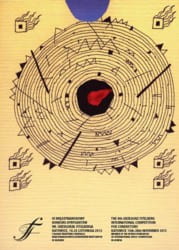 The All-Poland Poster Competition Promoting the 9th Grzegorz Fitelberg International Competition for Conductors in Katowice – October 2012: Professor Józef Hołard won the 1st prize, from amongst the 53 entries in this competition.
The All-Poland Poster Competition Promoting the 9th Grzegorz Fitelberg International Competition for Conductors in Katowice – October 2012: Professor Józef Hołard won the 1st prize, from amongst the 53 entries in this competition.
Eugeniusz Knapik World Premiere Concert and other performances: The Fitelberg Competition opened with a Gala Concert performed by the Silesian Philharmonic Orchestra and Choir on November 16 in the concert hall of the Szymanowski Music Academy in Katowice. Led by Maestro Błaszczyk, the program included the world premiere of Beauty Radiated in Eternity by Eugeniusz Knapik as well as Concert Overture by Stanisław Moryto. This was absolutely one of the best concert performances affiliated with the competition.
Several concerts dedicated to the competition and its patron took place over the course of 2011 with two of the orchestras Grzegorz Fitelberg conducted: the Warsaw Philharmonic Orchestra and the Silesian Philharmonic Symphony Orchestra. The March 18, 2011 concert of the Warsaw Philharmonic Orchestra featured a work composed by Fitelberg—his Symphonic poem From the Depths of the Sea, Op. 26—as well as Maurice Ravel’s Piano Concerto in G major and Felix Mendelsohn’s Symphony No. 4 in A major, Op. 90. This inaugural concert was led by conductor Claus Peter Flor with pianist Javier Perianes. In a second concert associated with the Competition, held in December 2011, conductor Chikara Imamura led performances of Mozart’s “Jupiter” Symphony in C major, K. 551 and Krzysztof Penderecki’s “Christmas” Symphony No. 2. Over the course of 2012,18 concerts were held that were connected with the GFICC as special tributes.
 Documentary Film Screening regarding Maestro Grzegorz Fitelberg: Thanks to the complete dedication of mezzo-soprano Jadwiga Teresa Stępień, who leads the Warsaw branch of the Soroptimists International, a documentary film Twarza do Orkiestry – Grzegorz Fitelberg by Stanislaw Pieniaki was shown during the Competition. For details and photos of the screening, see the event page at www.facebook.com.
Documentary Film Screening regarding Maestro Grzegorz Fitelberg: Thanks to the complete dedication of mezzo-soprano Jadwiga Teresa Stępień, who leads the Warsaw branch of the Soroptimists International, a documentary film Twarza do Orkiestry – Grzegorz Fitelberg by Stanislaw Pieniaki was shown during the Competition. For details and photos of the screening, see the event page at www.facebook.com.
Ms. Stępień continues to promote Fitelberg as a part of her project “Śladami Mistrzów” [In the Steps of the Maestro] with another upcoming concert dedicated to his legacy. To be held on December 14 at 7:30 p.m. in the Saska Kępa Culture Club in Warsaw, the concert will feature folk songs and Christmas carols sung by the Polihymnia Choir—to learn more about the concert, visit www.jadwigateresastepien.com
For more details on all aspects of the Competition, visit www.konkursfitelberg.pl.
[Sources: pwm.com.pl, konkursfitelberg.pl, polmic.pl, thenews.pl]
FOCUS: Marzena Diakun – Fitelberg Silver Baton Winner
From the archives of the Adam Mickiewicz Institute:
 One of the promising conductors of her generation, at age 31 she has traveled across Europe honing her craft, conducting some of Poland’s best orchestras and the National Radio Orchestra in Prague.
One of the promising conductors of her generation, at age 31 she has traveled across Europe honing her craft, conducting some of Poland’s best orchestras and the National Radio Orchestra in Prague.
Diakun was born in Koszalin, Poland, in 1981, and was drawn to the conductor’s podium from an early age. At concerts, her eyes fixed on the conductor and his baton. She began trying her hand at a profession largely dominated by men. Her idols are men: Günter Wand with his Bruckner symphonies, Arturo Toscanini’s Wagner, George Szell’s Brahms, Gergive’s Shostakovich. She often returns to vintage recordings by Witold Rowicki; for inspiration in 20th-century repertoire, she sits in on rehearsals of Kazimierz Kord, Jerzy Maksymiuk and Jerzy Salwarowski, to name a few. As she shared in an interview with Przegląd magazine, she’s most interested in the final effect and the sound of the orchestra, not necessarily conducting technique in itself.
Diakun’s skill as a conductor has been praised by Richard Rosenberg, conductor, producer and artistic director of the National Music Festival and the Union Symphony Orchestra. Rosenberg remarked that “her musicality is exceptional and based upon solid scholarship paired with fine instinct. I would rate her at the very top 5 percentile of her profession”.
She began conducting before graduating from the Karol Lipiński Music Academy in Wrocław, and earned her Master’s at the Universität für Musik und darstellende Kunst in Vienna and her Ph.D at the Music Academy in Kraków. She also studied with Howard Griffiths and Colin Metters in Zurich (2003) and with Pierre Boulez at the Luzern Festival (2011).
Her debut came during her second year of studies, in 2002, conducting the finale concert of the 17th International Percussion Music Days Symphony Gala in Koszalin. She has conducted the symphonic orchestras of Wroclaw, Katowice and Kraków. In 2003 she toured Germany, Switzerland and Denmark as the assisting conductor of the Orchestra of the Polish Opera. She worked with the National Radio Orchestra in Prague, the National Polish Radio Orchestra in Katowice, the philharmonic orchestras of Zielona Gora, Wrocław, Kalisz and Rzeszow, and the Young Wrocław Orchestra.
Diakun has won international awards including the highest distinction for conductors from the Polish Ministry of Culture in 2005 and second prize at the prestigious 59th Prague Spring Competition for Conductors in the Czech Republic. She was a finalist in the 4th International Lutosławski Conducting Competition in Poland in 2006. She was a semifinalist in 2008 in both the Quadaques Conductors Competition in Barcelona and Donatella Flick Competition in London. She was awarded first prize at the Fitelberg Competition in Katowice in 2011, and was awarded second prize in the same competition in November 2012.
Her previous appointments include assisting Jerzy Maksymiuk with the Koszalin Philharmonic Orchestra, and as Andrey Boreyko’s assistant with the Berner Symphony Orchestra and as Richard Rosenberg’s assistant during the National Music Festival. Her collaboration with the Smash Ensemble contemporary orchestra in Spain, since 2009, has brought premieres by Spanish composers in Portugal, Spain, Germany and Lithuania. She currently is a tenured lecturer at the Karol Lipinski Academy of Music in Wrocław.
Diakun takes a humble approach to her task, saying in the interview with Przegląd interview that “A conductor may get carried away by the music, but every case of form overshadowing content is a dangerous one. In Ravel’s Bolero, while it is a dance piece, it is enough for the conductor to show which instrument is to begin playing every few beats. The movement of the baton should be helpful, not a hindrance.”
[Source: culture.pl]
Prix France Musique Sacem For Mykietyn
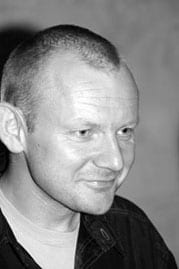 On November 12, Polish composer Paweł Mykietyn received the prestigious Prix France Musique SACEM 2012 Award for his music for the film Essential Killing by Jerzy Skolimowski. The Polish composer defeated 10 other artists, including Alexander Desplat and Howard Shore.
On November 12, Polish composer Paweł Mykietyn received the prestigious Prix France Musique SACEM 2012 Award for his music for the film Essential Killing by Jerzy Skolimowski. The Polish composer defeated 10 other artists, including Alexander Desplat and Howard Shore.
The award ceremony was held on the stage of the Theatre Trianon in Paris. Mykietyn received his award from chairman of the jury and director of Radio France Musique, Olivier Morel-Maroger, and SACEM director, Laurent Petitgirard.
The Award is presented jointly by Radio France Musique and the Société des Auteurs, Composers et Editeurs de Musique (SACEM) and honors original film music from a selection of movies, regardless of their country of production and type. The winner then receives a commission from Radio France for a work that is premiered a year later by the Radio France Philharmonic Orchestra during the next edition.
[Source: pwm.com.pl]
Kowalski Wins Penderecki Int’l Composers’ Competition
Works by the six finalists in the first Krzysztof Penderecki International Composers’ Competition ARBORETUM were given their world premiere by the Radom Chamber Orchestra during the final concert on November 10 in the Krzysztof Penderecki Concert Hall of the combined Music Schools in Radom.
Chosen by the Jury—Prof. Krzysztof Penderecki (Chairman), Paul Patterson, Piotr Moss, Maciej Żółtowski—the works premiered in this final round of the Competition were: Introjection for string orchestra by Wojciech Błażejczyk; Prismatic shapes for string orchestra by Bartosz Kowalski-Banasewicz; …Stretched for strings by Adam Porębski; In Memoriam V.M. – An Epitaph for Sixteen Strings by Stanko Simić; A Fantasia for String Orchestra by Geoffrey Allan Taylor; and Poem for string orchestra by Ignacy Zalewski.
 Patterned after the Toru Takemitsu Composition Award in Tokyo, the final round had only one judge (an eminent composer—in this case, Krzysztof Penderecki) who made his arbitrary determination after a public performance of the most interesting works. After the performance, Penderecki chose the following winners:
Patterned after the Toru Takemitsu Composition Award in Tokyo, the final round had only one judge (an eminent composer—in this case, Krzysztof Penderecki) who made his arbitrary determination after a public performance of the most interesting works. After the performance, Penderecki chose the following winners:
- Prize I: Bartosz Kowalski-Banasewicz – Prismatic shapes for string orchestra (pictured at right)
- Prize II: Adam Porębski – …Stretched for strings
- Prize III (ex-aequo): Wojciech Błażejczyk – Introjection for string orchestra and Ignacy Zalewski – Poem for string orchestra
Penderecki said the following to Anna S. Dębowska of Gazeta Wyborcza (November 12, 2012): “Prismatic shapes was absolutely the best work in the finals. If a composer can make a more than 10-minute composition out of a several-note motif, this testifies to his skills and sense of form.”
[Sources: beethoven.org.pl, rok.art.pl]
PWM’s 10th Ochlewski Competition
On November 6, the two winning entries in the 2012 Tadeusz Ochlewski Composition Competition were announced. The theme of this year’s competition was a composition for string orchestra. The Competition jury consisted of: Agnieszka Duczmal, Wojciech Widłak and Alicja Widzisz.
The Grand Prize went to a work entitled RiFFFonia by Paweł Piotr Pietruszewski. The composition Semi-overture by Adam Porębski also received recognition. Both works will be published by PWM and publicly performed by the Polish Radio Amadeus Chamber Orchestra conducted by Agnieszka Duczmal. Additionally, the victors received a cash prize. For profiles of the young winners, visit pwm.com.pl.
The Tadeusz Ochlewski Composers’ Competition for young artists was established in 2002 by Polish Music Publishers (PWM) in Kraków as a side activity to promote Polish compositional art. Tadeusz Ochlewski, a PWM writer and great friend of young composers, was adopted as patron of the competition.
[Source: pwm.com.pl]
Moss Wins Lifetime Achievement ‘Wielki Splendor’
Peter Moss has received the Honorary Lifetime Achievement “Wielki Splendor” [Grand Splendor] statuette for in the field of radio art. A composer of orchestral, chamber, choral, theater and film music, Moss made his radio theater debut as a teenager, writing music for Polish Radio in Toruń. He created the music for several Polish Radio Theatre plays, including Ani z Zielonego Wzgórza [Anne of Green Gables], Balu w operze[Opera Ball], Chłopców od Rudego [Boys on the Red], Fedry [Phaedra], Kapitana Fracasse’a [Captain Fracasse], Listów naszych czytelników [Letters from our Readers] and Miodu kasztelańskiego [Castellani Honey]. He was also the winner of this year’s Grand Prix at the Polish Radio and Polish Television Theatre “Two Theatres” Festival, for his music to a radio play of Shakespeare’s tragedy Hamlet, directed by W. Modestowicz.
Presented annually by the Polish Radio Theatre, the Wielki Splendor award recognizes those who make significant creative contributions to the development and strengthening of the rank of radio art in Poland. Also honored this year were actress Magdalena Zawadzka (Wielki Splendor), actress Irena Jun (Splendora Splendorów im. Krzysztofa Zaleskiego) and film and radio director Janusz Głowacki (Tele-Splendora im. Włodzimierza Ławniczaka).
[Sources: polskieradio.pl, tvp.pl]
Paszporty 2012 – Nominations For Classical Music
 The nominations for the 2012 Paszporty [Passports] Awards have been announced. The nominations in the Classical Music category represent various means of creativity and execution in the fields of ancient and contemporary music. This year’s nominees combine that which should be common to all good musicians—musical curiosity and the resulting constant willingness to seek new paths—with the highest level of skill in their craft.
The nominations for the 2012 Paszporty [Passports] Awards have been announced. The nominations in the Classical Music category represent various means of creativity and execution in the fields of ancient and contemporary music. This year’s nominees combine that which should be common to all good musicians—musical curiosity and the resulting constant willingness to seek new paths—with the highest level of skill in their craft.
Nominated for the second time due to the outstanding nature of her latest album, singer and musicologist Agnieszka Budzińska-Bennett (left) has been chosen for her endless study of archives of medieval music records and documents relating to its social and historical contexts, and creating excellent and the informative programs she creates out of this research.
 Composer Wojciech Blecharz (right) has been nominated for his tireless search for identity and his own musical language—each of his works is quite different and often surprising, including his first major composition for the National Opera in Warsaw, Transcryptum, whose debut is upcoming in May 2013. The third nominee, the TWOgether Duo (which recently decided to give up their combined titled and appear as simply Magdalena Bojanowicz and Maciej Frackiewicz) is constantly looking for new sounds and new repertoire for their intriguing ensemble of cello and accordion.
Composer Wojciech Blecharz (right) has been nominated for his tireless search for identity and his own musical language—each of his works is quite different and often surprising, including his first major composition for the National Opera in Warsaw, Transcryptum, whose debut is upcoming in May 2013. The third nominee, the TWOgether Duo (which recently decided to give up their combined titled and appear as simply Magdalena Bojanowicz and Maciej Frackiewicz) is constantly looking for new sounds and new repertoire for their intriguing ensemble of cello and accordion.

[Sources: polityka.pl, polityka.pl]
Festivals
Portrety Kompozytorów
On December 5-6, 2012, the 22nd edition of the “Composer’s Portraits” Festival will be held in at the Mazovia Regional Centre of Culture and Art on ul. Elektoralna 12 in Warsaw. As the name of the festival implies, each of the concerts is dedicated to a single composer in a monographic presentation of their output. This year’s composers are: Katarzyna Taborowska (b. 1974), Leszek Wisłocki (b. 1931), and Jerzy Maksymiuk (b. 1936). Concert details are below:
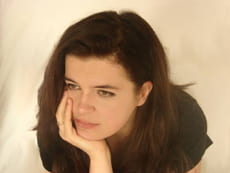 December 5, 2012
December 5, 2012
KATARZYNA TABOROWSKA
Elektroberek for violin and tape (2003)
A toć była cała sprawa for violin and tape (2005)
Transharmonicum for solo accordian (2004)
Trzy nocne opowiadania for soprano and tape (2009)
Through the Window for clarinet, violin, vibraphone/marimba, piano, accordian, tape and video (2004)*
Relay for percussion (2012)*
Blanka Dembosz – soprano
Maciej Frąckiewicz – accordian
Grzegorz Gorczyca – piano
Magdalena Kordylasińska-Pękala – percussion
Leszek Lorent – percussion
Miłosz Pękala – percussion
Artur Pachlewski – clarinet
Anna Zielińska – violin
Tadeusz Sudnik – projection
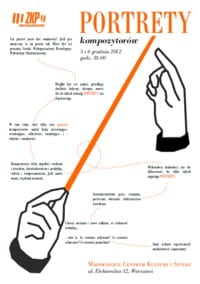 December 6, 2012
December 6, 2012
LESZEK WISŁOCKI
XIII Sting Quartet (2007)
Trio for two violins and viola (2011)
Sonata for trombone and piano (1985)
Lech Bałaban – viola
Jan Bałaban – violin
Wiktor Bałaban – violin
Grzegorz Gorczyca – piano
Andrzej Sienkiewicz – trombone
Wieniawski Quartet: Jarosław Żołnierczyk and Mirosław Bocek – violins, Lech Bałaban – viola, Maciej Mazurek – cello
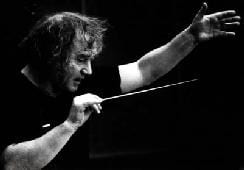 December 6, 2012
December 6, 2012
JERZY MAKSYMIUK
Wariacje Aleksandryjskie na klarnet solo (2007)
Liście gdzieniegdzie spadające na fortepian i smyczki (2010)
Lament serca Kielcom in memoriam na dwa klarnety, kotły, fortepian, głos kobiecy i smyczki (2012)
Adagio na smyczki (2012)
Grzegorz Gorczyca – piano
Anna Karasińska – voice
Leszek Lorent – percussion
Jerzy Maksymiuk – piano
Artur Pachlewski – clarinet
Kamilla Adamska – clarinet
Warsaw Soloists ‘CONCERTO AVENNA’ – Stanisław Winiarczyk, cond.
[Source: polmic.pl]
‘Silesian Quartet And Guests’ Festival
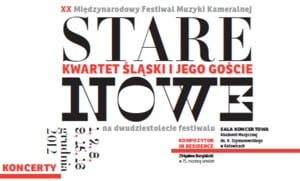 Since 1993, the Silesian String Quartet has been organizing the International Chamber Music Festival Silesian String Quartet and Guests. This year’s Festival will be held from December 1-16, 2012. As with every year’s edition, chamber music masterpieces for string quartet and other instruments are presented to the audience, featuring soloists who perform with the musicians of the Silesian String Quartet. This year’s Polish and American guests are: pianist Ewa Pobłocka, clarinetist Widaszek Roman, accordionist Marek Andrysek, pianist Roman Rabinovich, oboist Karolina Stelmachowska, clarinetist Bartosz Pacan, guitarist Marcin Dylla. There will also be two experienced Scandinavian chamber musicians—pianist Niklas Sivelöv (Sweden) and violist Tim Frederiksen (Denmark).
Since 1993, the Silesian String Quartet has been organizing the International Chamber Music Festival Silesian String Quartet and Guests. This year’s Festival will be held from December 1-16, 2012. As with every year’s edition, chamber music masterpieces for string quartet and other instruments are presented to the audience, featuring soloists who perform with the musicians of the Silesian String Quartet. This year’s Polish and American guests are: pianist Ewa Pobłocka, clarinetist Widaszek Roman, accordionist Marek Andrysek, pianist Roman Rabinovich, oboist Karolina Stelmachowska, clarinetist Bartosz Pacan, guitarist Marcin Dylla. There will also be two experienced Scandinavian chamber musicians—pianist Niklas Sivelöv (Sweden) and violist Tim Frederiksen (Denmark).
Every year, the festival also has its motto: in 2011, it was Stalowa Wola Generation, as works of Aleksander Lasoń, Eugeniusz Knapik and Andrzej Krzanowski were performed. This year’s theme is “Stare i Nowe” [Old and new].
All concerts will be held in the Concert Hall of the Karol Szymanowski Music Academy in Katowice. On Saturdays Dec.1, 8 and 15, concerts will take place at 7:00 p.m., and Sundays Dec. 2, 9 and 16 will take place at 5:00 p.m. The concerts will be accompanied by an exhibition of posters from the nineteen previous editions of the Festival. Admission to the concerts is free.
Festivals are accompanied by publications. In 2011, a six-CD album Stalowa Wola Generation was published during the festival, thanks to the Musica Pro Bono Foundation. It contains chamber music for or with string quartet by Aleksander Lasoń, Andrzej Krzanowski and Eugeniusz Knapik, recorded between 1983 and 2011. It has been nominated for the Fryderyk annual award of Polish music, as the Album of the Year, Chamber Music.
[Sources: polmic.pl, silesian-quartet.art.pl]
Performances
Warsaw Philharmonic Orchestra At CSUN VPAC
By Gary Fitelberg
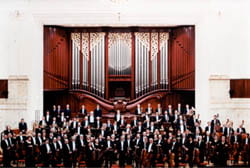 As a part of their 2012 tour of the United States, Antoni Wit led the Warsaw Philharmonic Orchestra in a wonderful concert which took place in the Los Angeles area at the CSUN Valley Performing Arts Center on November 8, 2012.
As a part of their 2012 tour of the United States, Antoni Wit led the Warsaw Philharmonic Orchestra in a wonderful concert which took place in the Los Angeles area at the CSUN Valley Performing Arts Center on November 8, 2012.
A venerable European institution, the Warsaw Philharmonic came to the Valley Performing Arts Center for a presentation of works by Tchaikovsky and Beethoven. Since its first concert in 1901, the Warsaw Philharmonic has remained a leading orchestral ensemble and has played a major role in introducing audiences worldwide to many of the now famous classical composers and musicians from central Europe.
Appearing with the orchestra was pianist Yulianna Avdeeva, 2010 winner of the International Frederic Chopin Piano Competition. The first woman to win this competition in 45 years, she was also awarded the Krystian Zimmerman Prize for the best sonata performance.
The scheduled performance included the following composers and compositions: Ludwig van Beethoven’s Piano Concerto No. 5 in E-flat major “Emperor,” Op. 73 and Pyotr Ilyich Tchaikovsky’s Symphony No. 6 in B minor “Pathétique,” Op. 74.
 With Avdeeva at her peak, the piano concerto was performed magnificently and majestically. As she performed the most difficult passages she was praised by Wit with an approving glance and a huge smile. Wit was very pleased with her performance and gave her a kiss on the cheek after the second movement. Andeeva plays the piano with precision as well as great emotional depth. Her fingers and hands move faster than the speed of sound. The orchestra received such a warm welcome from the audience that they played an additional five encores, concluding with Tchaikovsky’s 1812 Overture under the baton of Conductor Wit.
With Avdeeva at her peak, the piano concerto was performed magnificently and majestically. As she performed the most difficult passages she was praised by Wit with an approving glance and a huge smile. Wit was very pleased with her performance and gave her a kiss on the cheek after the second movement. Andeeva plays the piano with precision as well as great emotional depth. Her fingers and hands move faster than the speed of sound. The orchestra received such a warm welcome from the audience that they played an additional five encores, concluding with Tchaikovsky’s 1812 Overture under the baton of Conductor Wit.
Antoni Wit has been the managing and artistic director of the Warsaw Philharmonic Orchestra and Choir since January 2002. One of Poland’s most highly regarded Polish conductors, he has performed in nearly all the major world musical centers, conducting such leading symphony orchestras as the Berliner Philharmoniker, Staatskapelle Dresden, Philharmonia, BBC London, and many others. Maestro Wit has made over 180 recordings, and his collaboration with Naxos has resulted in the release of over 50 discs of Polish music. He is one of the few artists in the world whose CDs have sold over three million copies.
Following her sensational win of the First Prize at the 2010 Chopin Competition in Warsaw, Yulianna Avdeeva has given debut performances with the New York Philharmonic under Alan Gilbert in Warsaw and New York, and with the NHK Symphony Orchestra under Charles Dutoit in Tokyo. Yulianna Avdeeva’s repertoire spans a wide range of music from Bach to the 20th century. She has earned prizes at many international competitions including the Bremen Piano Contest 2003, the Concours de Genève 2006, and the Arthur Rubinstein Competition in Poland.
This 2012 USA tour consisted of seventeen concert performances commencing in Worcester. MA on October 19th and ended November 12th in San Francisco, CA. Other concerts took place in Greenvale, NY; New Brunswick, NJ; Amherst, MA; Storrs, CT; Annapolis, MD, Lansdale, PA; Purchase, NY; Troy, NY; Athens, GA; Charleston, SC; Gainsville, FL; Aliso Viejo, CA; Northridge, CA. The program of the concerts on this tour have contained some combination of the following works—Lutosławski: Little Suite; Chopin: Piano Concerto No. 2, op. 21, F Minor; Dvorak: Symphony No. 8, op. 88, G Major; Beethoven: Piano Concerto No. 5 in E-flat major, Op. 73 “Emperor”; Tchaikovsky: Symphony No. 6 in B minor, Op. 74 “Pathétique”; Brahms: Symphony No. 2, op. 73, D major. The tour was organized by Columbia Arts Management, Inc. with additional support for the Amherst concert from the Polish Cultural Institute New York.
Following the tour, Maestro Wit returned to Poland to lead the jury at the 9th Grzegorz Fitelberg International Competition for Conductors in Katowice during November 15-25. It was a real pleasure and special treat for me to hear the orchestra once led by Grzegorz Fitelberg (1908-1911, 1921-1934) locally, practically in my backyard.
The CSUN Valley Performing Arts center should be commended for bringing two large Polish orchestras to the forefront of classical music in the Los Angeles area during 2012—the Wrocław Philharmonic Orchestra also appeared in February. Additionally, Polish pianist Anna Kijanowska performed a special tribute to Polish composer Karol Szymanowski (1882-1937) in October. Hopefully, this will start a trend of bringing Polish music to the shores of America, especially Los Angeles.
Concert Review – Duo Klavitarre
By Gary Fitelberg
 Duo Klavitarre—Jolanta Ziemska (piano) and Maciej Ziemski (guitar) —gave an excellent concert at Los Angeles Valley College (LAVC) on October 20, 2012. The large program consisted mainly of Italian and Spanish composers. There was also one special arrangement of Chopin on the concert program. One could certainly and clearly feel the love between these two and for their music.
Duo Klavitarre—Jolanta Ziemska (piano) and Maciej Ziemski (guitar) —gave an excellent concert at Los Angeles Valley College (LAVC) on October 20, 2012. The large program consisted mainly of Italian and Spanish composers. There was also one special arrangement of Chopin on the concert program. One could certainly and clearly feel the love between these two and for their music.
They played largely to an audience of guitarists as the event was sponsored by the American Guitar Society (AGS). Gregory Newton is President of the AGS while his wife Grazyna Newton is on the Board of Directors. “The purpose of the AGS,” as it states in the minutes of the meeting of the board in 1923, “is to promote interest in classical guitar through the educational program, encourage composers to enrich literature and to develop both a scholarship and publication fund.” Since September 2010 the American Guitar Society resides at the home of its new host, the Los Angeles Valley College Music Department, beginning a new chapter in its long history and maintaining its full range of activities.
Jolanta Ziemska and Maciej Ziemski are not only a married couple but also a successful musical duo from Poland. With repertoire from baroque to modern, concert programs include their arrangements of works from Chopin, Piazzolla, Tansman, Bach and Mozart.
As the Duo Klavitarre, pianist Jolanta, and guitarist Maciej have been performing together for eight years. Both artists graduated with honors from the Music Academy in Łódź, Poland, where they found romance and discovered their joint love of playing music. The two strong musical personalities complement one another extremely well and offer instrumental virtuosity coupled with spontaneity and excellent interaction. The unusual combination of instruments as well as surprising arrangements promises an exciting and diverse program.
Together, Jolanta Ziemska and Maciej Ziemski bring to the stage performance experience in Poland, Bulgaria, Romania, Italy, Denmark, Belgium, Germany, Spain, Czech Republic, Austria, Venezuela, Canada, USA and South Korea, and offer a polished and lively interpretation combined with astounding sound. The Ziemski’s are also the artistic directors of the International Guitar Festival in Grotniki and Jarosaw, Poland.
This was part of a 2012 concert tour of California that included Valley Glen, Martinez, Roseville, San Francisco, La Mesa and also Tempe, Arizona.
Gary Fitelberg is a musicologist, music critic and historian.
Szymanowski, Moniuszko & Górecki In Paris
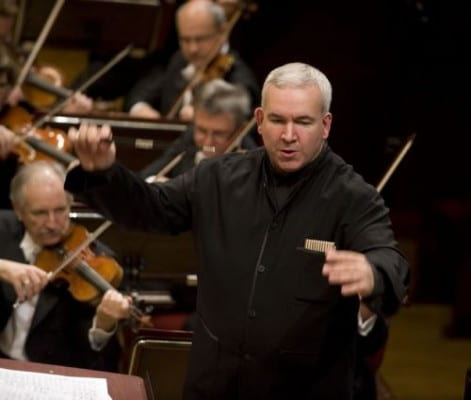 On November 13, Sinfonia Varsovia under the baton of Marc Minkowski (both pictured above) performed fragments of Stanisław Moniuszko’s opera Halka, Karol Szymanowski’s Piano Concerto No.2 op.61 and Henryk Mikołaj Górecki’s Symphony No. 3 “Symphony of Sorrowful Songs” op. 36 in the Concert Hall of the Cité de la Musique in Paris. Soloists were Jakub Jakowicz, violin and Marita Solberg, soprano.
On November 13, Sinfonia Varsovia under the baton of Marc Minkowski (both pictured above) performed fragments of Stanisław Moniuszko’s opera Halka, Karol Szymanowski’s Piano Concerto No.2 op.61 and Henryk Mikołaj Górecki’s Symphony No. 3 “Symphony of Sorrowful Songs” op. 36 in the Concert Hall of the Cité de la Musique in Paris. Soloists were Jakub Jakowicz, violin and Marita Solberg, soprano.
[Sources: pwm.com.pl, citedelamusique.fr]
Discography
Plowright & Szymanowski On Hyperion
 Zarebski/Zelenski: Piano Quintet & Piano Quartet
Zarebski/Zelenski: Piano Quintet & Piano Quartet
Władysław Żeleński (1837-1921): Piano Quartet in C minor Op 61, and Juliusz Zarębski (1854-1885): Piano Quintet in G minor Op 34
Jonathan Plowright – piano, Szymanowski Quartet
Hyperion CDA67905
BBC Music Magazine CHAMBER CHOICE December 2012
“Virtuosity is caught in a performance of passionate warmth”
British pianist (and honorary Pole) Jonathan Plowright has teamed up for this recording with the Polish/Ukrainian Szymanowski Quartett to record the Żeleński Piano Quartet and the Zarębski Piano Quintet, two important chamber works from 19th-century Poland, in quality equivalent perhaps to Dvorák and Brahms, but completely unknown outside their native country.
Zarębski was a virtuoso pianist, more feted during much of his short life as a performer than a composer. However his Piano Quintet is truly a masterpiece, demonstrating an originality and stature that match and even surpass better-known piano quintets by better-known composers. It shows a remarkably fresh ear for symphonic thinking, motivic development and sheer melodic invention. Żeleński was a teacher rather than a performer, ending his distinguished academic career as Director of the Conservatory in his home town of Kraków. His Piano Quartet is a passionate, lyrical work, combining the Romanticism of Mendelssohn and Schumann with a piquant Slavic element.
[Sources: press release, hyperion-records.co.uk]
Between Contemporaneity, Classic And Tradition
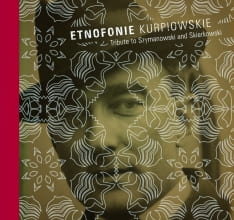 Etnofonie Kurpiowskie. Tribute to Szymanowski and Skierkowski
Etnofonie Kurpiowskie. Tribute to Szymanowski and Skierkowski
Published by 4ever Music, available at folk24.pl
“Etnofonie Kurpiowskie. Tribute to Szymanowski and Skierkowski” is an original project created by Weronika Grozdew-Kołacińska (b. 1975 in Białystok), a Polish folk singer and ethnomusicologist with Bulgarian heritage and a Doctor of Arts. The idea of the “Etnofonie Kurpiowskie” is based on the stylistic collision of folk music, improvisation, and 20th century classical music. Szymanowski’s musical approach, Skierkowski’s etnomusicological studies, and traditional folk music are combined together with improvisational technique and instrumental and vocal virtuosity, thus showing the power of musical and cultural tradition. In 2012 “Etnofonie Kurpiowskie” were nominated for prestigious Polish award Koryfeusze Muzyki Polskiej [Coryphaeus of Polish Music] in the category Event Of The Year.
The main inspiration and the idea to connect tradition, archaic and rawness with classic, convention and contemporaneity in “Etnofonie Kurpiowskie” comes from Karol Szymanowski’s song set entitled Pieśni Kurpiowskie [Kurpie Songs], which is based on the traditional music of the Kurpie region of Poland. This work becomes a space for finding common musical language, which bonds different and multicolored means of musical expression.
In “Etnofonie Kurpiowskie” we also find the spirit of Władysław Skierkowski. All songs from the above mentioned work by Szymanowski comes from Skierkowski’s collection of traditional texts. Skierkowski was not only the priest but also an ethnographer. His book Puszcza Kurpiowska w pieśni [Kurpie in song] is not only the most important source of information about the musical culture of Kurpie, but has also served as a treasure trove of inspiration for a great number of composers (to name just a few: Szymanowski, Panufnik, Kondracki, Maciejewski, Lutosławski, Maklakiewicz, Górecki, Moryto, Łukaszewski etc.), musical ensembles, folk musicians and restorers of traditional polish styles of singing.
In “Etnofonie Kurpiowskie” we also hear the voices of outstanding folk singers Waleria Żarnoch and Waleria Mierzejak. The recordings come from the archives of the Radio Folk Culture Center and M. Sobieski’s Polish Academy of Science. Their voices once enchanted Władysław Skierkowski and even now inspire and delight us.
In fact “Etnofonie Kurpiowskie” is an original, pioneer project. It includes new arrangements of traditional songs, and Szymanowski’s music. These arrangements have been enriched with improvised solos on folk instruments. The instrumental performances on this disc are something truly new in Polish music—traditional folk instruments have never reached such a professional level and such virtuosity. When previously joined with classical, professional music they were treated only as colorful background. The vocal performances also present a unique dialog between the classically trained soprano and tenor and the raw voices of traditional Kurpie folk singers. To this mixture have been added electronic sounds (including quotes from archival recordings), which lend an interesting and very specific sprit to the entire project.
Several remarkable artists participated in this project. Original arrangements: Weronika Grozdew-Kołacińska, Bartosz Kowalski and Maciej Kierzkowski. Vocals: Weronika Grozdew-Kołacińska (folk vocal), Justyna Stępień (soprano), Rafał Grozdew (tenor), Waleria Żarnoch (folk vocal), Waleria Mierzejak (folk vocal), Magdalena Sobczak-Kotnarowska (folk vocal), Barłomiej Pałyga (sygyt vocal), Agata Hartz-Hanaj (folk vocal), Jolanta Kossakowska (folk vocal), Katarzyna Mróz (folk vocal) and “Zawady” vocal ensemble. Instruments: Ewa Pelwecka (piano), Marta Maślanka (dulcimer, ring drum), Bartłomiej Pałyga (podge), Jan Kania (warsaw pedal harmony), Bartosz Niedźwiecki (folk violin), Małgorzata Szarlik-Woźniak (violin), Maria Pomianowska (fiddle from Płock, suka from Biłgoraj), Sylwia Świątkowska (fiddle from Płock, suka, violin), Magdalena Sobczak-Kotnarowska (dulcimer, baraban), Justyna Janiszewska (viola), Tomasz Pokrzywiński (cello), Wojciech Pulcyn (double bass), Maciej Cierliński (hurdy gurdy), Leszek Lorent (percussion), and the Sinfonia Speranza Orchestra directed by Maciej Tarnowski. Sound: Ewa Guziołek, Rafał Kołaciński, Wojciech Lubertowicz. Graphics: Dymitr Grozdew (portraits), Bożydar Grozdew (album concept), Wiesława Bogdańska (traditional cutouts), and Sylwia Leszczyńska-Chalamońska (photos). Coordination of the project: Weronika Grozdew-Kołacińska, Katarzyna Mróz, Rafał Grozdew, and Rafał Kołaciński.
[Sources: meakultura.pl, folk24.pl. Translation by: Maria Peryt]
Weinberg Symphonies
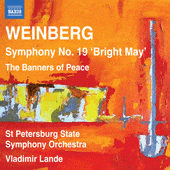 Mieczysław WEINBERG (1919–1996): Symphony No. 19 ‘Bright May’, Op. 142 and The Banners of Peace – Symphonic Poem, Op. 143
Mieczysław WEINBERG (1919–1996): Symphony No. 19 ‘Bright May’, Op. 142 and The Banners of Peace – Symphonic Poem, Op. 143
St Petersburg State Symphony Orchestra, Vladimir Lande – cond.
Naxos 8.572752
Mieczysław Weinberg’s 26 symphonies are seen today as a substantial continuation of the Russian tradition. Symphony No. 19 marks ‘Bright May’ as the month in which the Great Patriotic War came to an end, but expressed with ominous apprehension as well as celebration. The Banners of Peace subsumes traditional and revolutionary songs to create an extrovert work which avoids the bombast of propaganda. Gramophone has acclaimed the ‘understanding and fervour’ of Vladimir Lande’s ‘greatly superior’ conducting of Weinberg’s Symphony No. 6 (Naxos 8.572779).
[Sources: press release, naxos.com]
LAMC Recording Of Górecki
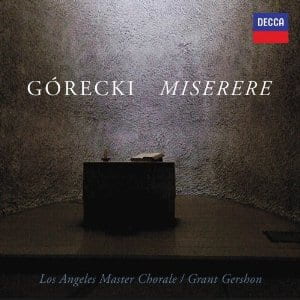 Górecki: Miserere
Górecki: Miserere
Henryk Mikołaj Górecki (1933-2010): Lobgesang, Op.76; Miserere, Op.44; Pieśni Maryjne, Op.54
Los Angeles Master Chorale, Grant Gershon – cond.
Decca CD 00289 478 3537, available at www.amazon.com
Grant Gershon and the Los Angeles Master Chorale celebrate Henryk Górecki’s sublime music of the human spirit. Devotees of choral music have known about the Los Angeles Master Chorale and its outstanding work for almost half a century. The wider world woke up to the professional choir’s majestic qualities two years ago thanks to the success of its Decca debut recording of compositions by Nico Muhly. A Good Understanding served notice of the musical vitality and technical excellence of the 110-strong Master Chorale and its rapport with Music Director, Grant Gershon. The choir’s performance was described as “inspired” by the New York Times and praised as “clear and wondrous” by Cleveland’s Plain Dealer.
The Los Angeles Master Chorale’s second Decca album underlines the visceral excitement and transformative eloquence of their masterful music-making. Miserere, set for international release on 3 September, represents the Grammy© Award-nominated group’s tribute to the life and work of Henryk Mikołaj Górecki (6 December 1933 – 12 November 2010), known to millions for his Symphony of Sorrowful Songs and as a brave champion of Poland’s struggle for independence from Soviet control.
A decade has passed since Grant Gershon and the Master Chorale first performed Górecki’s Miserere. The twelve-movement work moved its audience and performers to tears then. “It was an overwhelmingly emotional experience for all of us”, Gershon recalls. “Over the ensuing ten years, we have explored much of the a cappella choral music of Górecki, and we continue to find new wellsprings of compassion and humanity in these works.” The conductor and his acclaimed professional chorus naturally turned to Górecki’s Miserere as the centrepiece for their latest Decca album, placing it in company with the Polish composer’s Pieśni Maryjne (“Marian Songs”) and his Lobgesang (“Hymn of Praise”), their second appearance on a major label.
Miserere was recorded in the Master Chorale’s home, the Walt Disney Concert Hall. The landmark venue’s remarkable acoustics ideally complement the choir’s famously rich sound. The album also captures the full expressive force and profound spirituality of the Master Chorale’s approach to Górecki. Grant Gershon locates the ties that bind his singers to the composer’s work in three words from Miserere: “Domine Deus noster”. “These three words, ‘Lord our God’, intoned (like a mantra) countless times by the choir, contain a universe of sorrow and solidarity”, he observes. “The Miserere exemplifies Górecki’s uncompromising belief that one can reach the underlying truth in a piece of art only by stripping away all that is extraneous.”

Early childhood was an idyllic time for Górecki. Young Henryk grew up on the family farm in Śląsk (or Polish Silesia), a place of wheat fields and hay meadows boldly punctuated by coal mines and steel mills. The boy’s world was upturned by the death of his mother and, soon after, by a fall that dislocated his hip. Górecki received poor medical treatment and developed life-threatening complications. His father, a railway employee and amateur musician, did little to encourage his son’s love of music but eventually sent him to study violin with a local teacher. In September 1939, Nazi and Soviet forces invaded Poland and subjugated the country within five weeks. Shortly before the Second World War’s end, Górecki witnessed the desperate plight of inmates from Auschwitz-Birkenau concentration camp as they were forcibly marched through Silesia. What he saw left a lifelong mark on the composer, his worldview and his music. Poland’s post-war experience of Soviet communism and its many injustices also informed Górecki’s artistic development and gradual move towards composing sacred music.
Miserere was written in 1981 as a protest against a violent attack by police on members of the Rural Solidarity union in the northern Polish city of Bydgoszcz. Underground press reports of police brutality incensed ordinary citizens and hardened attitudes against the ruling communist regime. The imposition of marshal law in December 1981 meant that Górecki’s work could not be performed. It finally received its world premiere in September 1987, heard for the first time close to the site where the young Roman Catholic priest and champion of the Solidarity movement, Father Jerzy Popiełuszko, had been murdered several years earlier by members of the state security services.
Górecki drew inspiration from his homeland’s Church Songbook, originally compiled in the late 1870s while Poland was still partitioned within the Russian, German and Austro-Hungarian empires. Four of his five Pieśni Maryjne, written in the mid-1980s, are based on melodies and texts from the Church Songbook. The composer forged the text of Lobgesang from words taken from the Book of Psalms. The eight-minute work, for choir and glockenspiel, was first performed in August 2000 at St Johanneskirche in Mainz, Germany, to mark the 600th anniversary of Johannes Gutenberg, the man who introduced Europe to the printing press. Grant Gershon and the Los Angeles Master Chorale gave the US premiere of Lobgesang at Walt Disney Hall in 2008.
 “To reflect Górecki’s passionate belief in the ability of music to transcend borders and unite peoples, it seems fitting that each of the three works on this recording is sung in a different language,” comments Gershon. “It is a tribute to the astonishing acoustics of our home, the Walt Disney Concert Hall, that these very different pieces can resonate with the right balance of grandeur, intimacy and warmth. It is therefore with enormous pleasure yet deep humility that we offer these recorded performances of the great choral works of Henryk Górecki.”
“To reflect Górecki’s passionate belief in the ability of music to transcend borders and unite peoples, it seems fitting that each of the three works on this recording is sung in a different language,” comments Gershon. “It is a tribute to the astonishing acoustics of our home, the Walt Disney Concert Hall, that these very different pieces can resonate with the right balance of grandeur, intimacy and warmth. It is therefore with enormous pleasure yet deep humility that we offer these recorded performances of the great choral works of Henryk Górecki.”
[Source: lamc.org]
Mizerska On Toccata
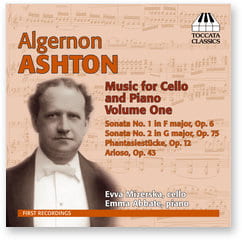 Algernon Ashton: Music for Cello and Piano, Volume I
Algernon Ashton: Music for Cello and Piano, Volume I
Arioso, Op. 43; Sonata No. 1 in F major, Op. 6; Phantasiestücke, Op. 12; Sonata No. 2 in G major, Op. 75
Evva Mizerska, cello; Emma Abbate, piano
Toccata Classics TOCC0143
Polish cellist Evva Mizerska has released a new album of music for cello and piano by English composer Algernon Ashton (1859-1937). Apart from the Sonata in G major, all works are recording premieres. The recording of the CD has been partly funded by the Polish Cultural Institute in London and well as private sponsors and Toccata Classics itself, a British labelwith worldwide distribution through Naxos.
Algernon Ashton, born in Durham in 1859, is one of the best-kept secrets in British music, with a generous output of piano music, chamber works and songs. Rutland Boughton wrote that he ‘seems to pour out great musical thought as easily as the lark trills its delight in cloudland’: although Ashton’s writing for both cello and piano is virtuosic, what strikes the ear is the quality of his melodic inspiration – the lyrical immediacy of his tunes suggests Schubert, set in a style of Brahmsian richness. Most of the works on this disc are first recordings.
[Source: press release]
Obituary
Maria Fołtyn
From the international news service of Polish Radio:
One of the most popular Polish sopranos of the last century, Maria Fołtyn, has died in Warsaw at the age of 88. Having sky-rocketed to stardom for her excellent portrayal of the eponymous character in Stanisław Moniuszko’s Halka, she became an indefatigable promoter of the output of the father of Polish national opera.
She sang the part of Halka over 200 times, in Poland and abroad.
At the age of 45, she took up studies in theatre direction at the State Higher School of Theatre in Warsaw and in the 1970s and 80s produced Moniuszko’s ‘Halka’ and ‘The Haunted Manor’ in Mexico, Turkey, Cuba, the United States, Canada, Romania and Brazil.
Born in Radom in 1924, Maria Fołtyn studied voice in Poland – with such famous singers as the bass Adam Didur ( 1874-1946) and the soprano Ada Sari and abroad, in Italy and Germany. She was a prizewinner of the vocal competitions in Vercelli (1956) and Chiararte (1957).
In the 1960s she regularly appeared in the opera theatres in Leipzig, Lubeck and Hamburg. She also developed a successful career as a recitalist, with performances in New York, Toronto, Rome, Milan, Bonn, Moscow and Prague.
She served for many years as director of the Moniuszko International Festival in Kudowa-Zdrój and the Moniuszko International Vocal Competition in Warsaw. (mk/pg)
[Source: thenews.pl]
Anniversaries
Born This Month
- 3 December 1896 – Boleslaw SZABELSKI, composer (d. 1979)
- 5 December 1899 – Boleslaw WOYTOWICZ, composer (d. 1980)
- 6 December 1933 – Henryk Mikolaj GÓRECKI, composer(d. 2010)
- 11 December 1876 – Mieczyslaw KARLOWICZ, composer (d. 1909, under an avalanche in Tatra mountains)
- 14 December 1789 – Maria SZYMANOWSKA, composer, virtuosa pianist (d. 1831, of cholera). Read her biography: PMHS Vol. 9
- 18 December 1907 – Roman PALESTER, composer, broadcaster (d. 1989)
- 23 December 1830 – Adam MINCHEJMER, composer and conductor (d. 1904)
- 24 December 1859 – Roman STATKOWSKI, composer, teacher (d. 1925)
- 29 December 1902 – Henryk VARS , film and popular music composer (d. 1978)
Died This Month
-
3 December 2004 – Marek STACHOWSKI, professor, composer, and administrator at the Music Academy in Kraków (b. 1936)
-
11 December 1945 – Seweryn EISENBERGER, pianist (b. 1899)
-
20 December 1834 – Maurycy MOCHNACKI, music critic, writer, pianist (b. 1804)
-
21 December 1938 – Arnold LUDWIK, violin maker (b. 1873)
-
21 December 2005 – Ryszard SIELICKI, pianist and composer (b. 1916)
-
23 December 1885 – Artur BARTELS, pop singer (b. 1818)
-
23 December 1869 – Julian FONTANA, close friend and musical associate of Chopin (b. July 1810)
-
24 December 1898 – Eugeniusz PANKIEWICZ, pianist and composer (b. 1857)
-
26 December 1945 – Stefan STOINSKI, music ethnographer, writer, conductor (b. 1891)
-
29 December 1913 – Jadwiga SARNECKA, pianist, composer, poet (b. 1877)
-
31 December 1944 – Marian Teofil RUDNICKI, conductor, composer (b. 1888)







